Vol. LVI
THE MESSENGER
Copyright 1930 by Thomas Duke APRIL, 1931
TABLE of CONTENTS
V10LET&-Paul Cale
AN AccoUNT OF AN EVENING VISIT-Harold Cooper
MEDITATION-Paul Cale
THE ASH AND THE Box-Joseph Holland
LAMENT FOR FAUN&-H. H. C.
DAY'S END-George H. Kerr
SALAMMBo-Harold Cooper
EDITORIAL •
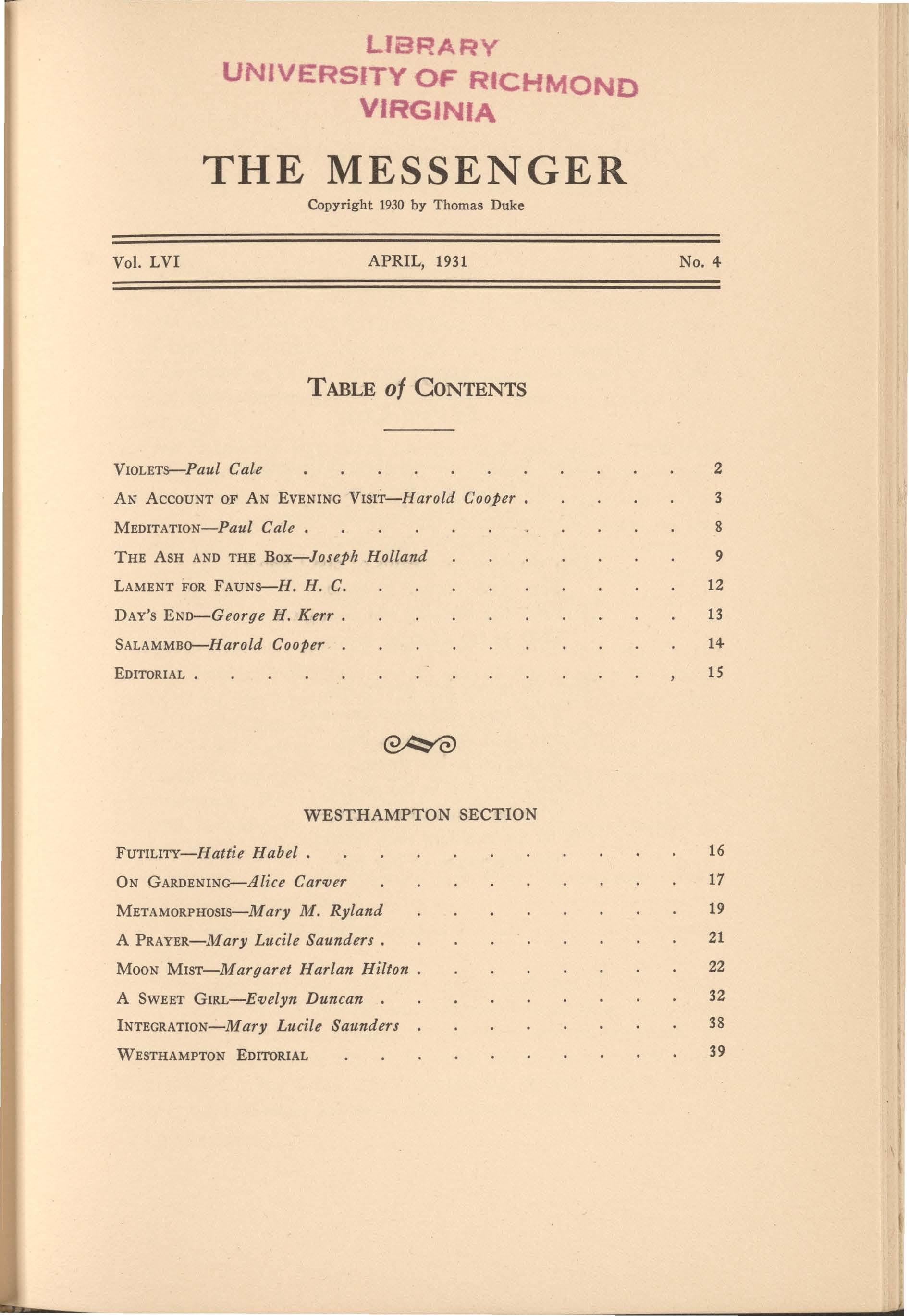
FUTILITY-H attic Habel
WESTHAMPTON SECTION
ON GARDENING--Alice Carver
METAMORPHOSis-M ary M. Ryland
A PRAYER-Mary Lucile Saunders .
MooN MIST-Margaret Harlan Hilton .
A SWEET GIRL-Evelyn Duncan . INTEGRATION-Mary Lucile Saunders

VIOLETS
By PAUL CALE
When nodding violets close their eyes, And ' fairies o'er them weep, The moon for them the dark defies, And stars their vigil keep. They dream their dreams of one I know, They walk around in sleep, And e'er the morning sun doth glow They to my mistress creep.
They flit across her snowy bed With sighs and sweet caresses To rest until the night is fled Entangled in her tresses. In vain, they try to tell no tale Of what befell them there,For in the morning they exhale The fragrance of her hair.

AN ACCOUNT OF AN EVENING VISIT MADE BY MR. LYNNWOOD TO MR. HEATON
By HAROLD COOPER
THE weather was a bit disagreeable, so I made a fire in the small grate and took down a few books which Lynnwood and I would probably refer to in our talking. For Lynnwood was coming to see me that evening, and we derived a deep tranquility from a long conversation, even if the room was cramped, outfitted in a motley manner, and bedecked with odd garniture, as mine was in those rosily distant days.
Our friendship was based on the usual number of antithetical concepts, and strengthened beyond the average amiability by years of mutual understanding in matters generally called trivial, but which reflective persons know, are the only ones that really count. In fact, he often poked at my fire without arousing any feeling of irritation in me; and he was the one person in my life who could open a package of cigarettes, or sharpen a pencil just as I thought it should be done.
Lynnwood was very tall and quite lean; his face smooth and rather serious as a rule, however his eyes showed a sense of sardonic humor at the appropriate time. Inevitably he wore gray clothes which he carried well enough, for he never thought of them. And now he toyed with a tall glass-his lanky legs sprawled out towards the fire.
To add to my comfort, the rain swished against the windows with a regular beat. Each louder roar of thunder caused my cat to open one eye. I tossed my book on the table, and Lynnwood turned his head to see the title.
"I thought you were through with Poe," he grunted. "What brings you to a rereading ?"
"I am thinking of writing a paper for Dr. on the women of Edgar Poe."
"It's a risky business. You know well enough that only the French and a handful of the English and Americans understand him; most of the local intelligentsia consider it a mark of cultural immaturity to spend much thought on Poe. Of course that is because he was too introverted for the extroverted commonalty of this country. They see only the surface of his work. But about the women of Poe ... "?
So I began:
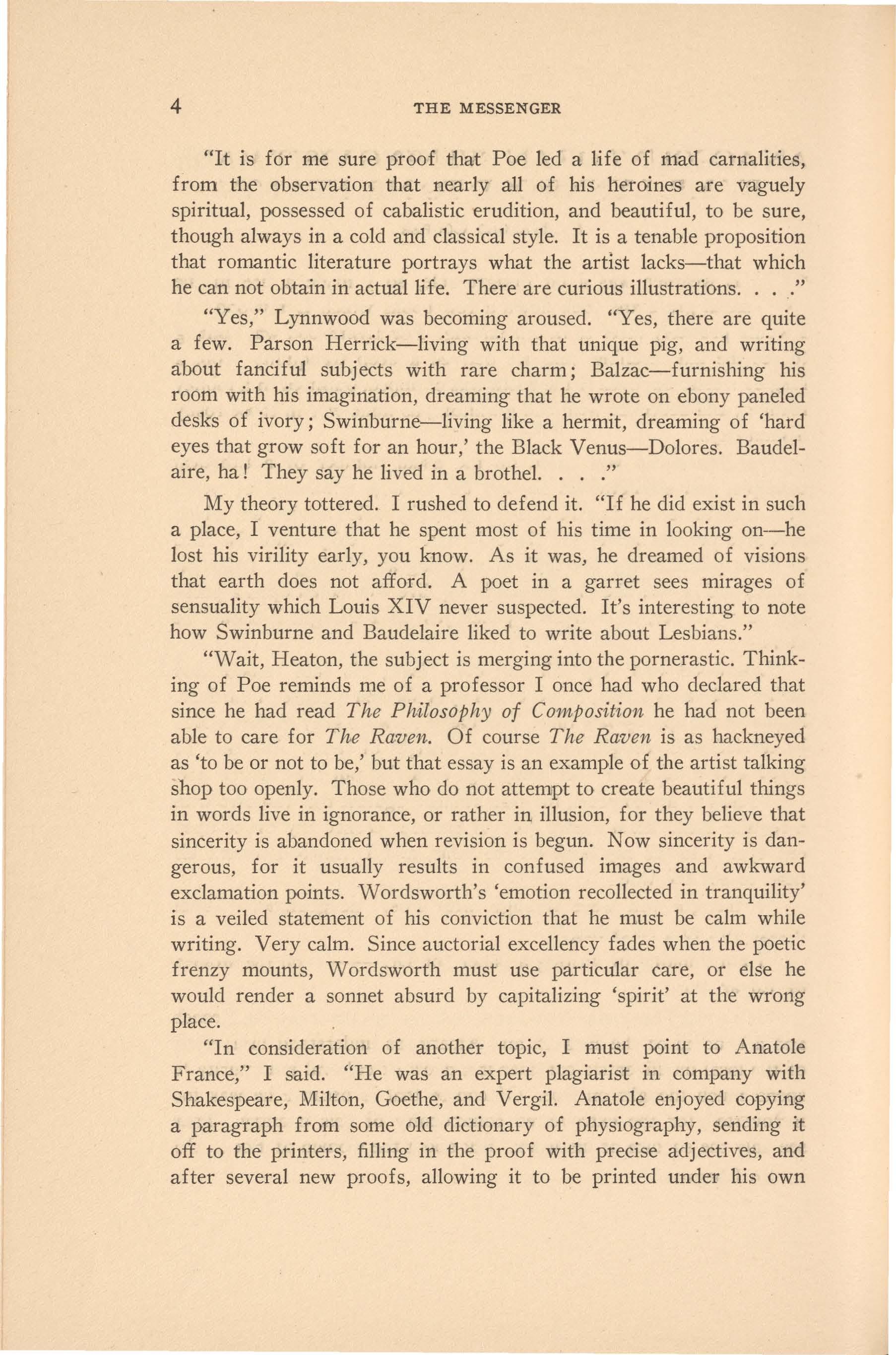
THE MESSENGER
"It is for me sure proof that Poe led a life of mad carnalities, from the observation that nearly all of his heroines are vaguely spiritual, possessed of cabalistic erudition, and beautiful, to be sure, though always in a cold and classical style. It is a tenable proposition that romantic literature portrays what the artist lacks-that which he can not obtain in actual life. There are curious illustrations .... "
"Yes," Lynnwood was becoming aroused. "Yes, there are quite a few. Parson Herrick-living with that unique pig, and writing about fanciful subjects with rare charm; Balzac-furnishing his room with his imagination, dreaming that he wrote on ebony paneled desks of ivory; Swinburne-living like a hermit, dreaming of 'hard eyes that grow soft for an hour,' the Black Venus-Dolores. Baudelaire, ha! They say he lived in a brothel. . . ."
My theory tottered. I rushed to defend it. "If he did exist in such a place, I venture that he spent most of his time in looking on-he lost his virility early, you know. As it was, he dreamed of visions that earth does not afford. A poet in a garret sees mirages of sensuality which Louis XIV never suspected. It's interesting to note how Swinburne and Baudelaire liked to write about Lesbians."
"Wait, Heaton, the subject is merging into the pornerastic. Thinking of Poe reminds me of a professor I once had who declared that since he had read The Philosophy of Composition he had not been able to care for The Raven. Of course The Raven is as hackneyed as 'to be or not to be,' but that essay is an example of the artist talking shop too openly. Those who do not attempt to create beautiful things in words live in ignorance, or rather in illusion, for they believe that sincerity is abandoned when revision is begun. Now sincerity is dangerous, for it usually results in confused images and awkward exclamation points. Wordsworth's 'emotion recollected in tranquility' is a veiled statement of his conviction that he must be calm while writing. Very calm. Since auctorial excellency fades when the poetic frenzy mounts, Wordsworth must use particular care, or else he would render a sonnet absurd by capitalizing 'spirit' at the wrong place.
"In consideration of another topic, I must point to Anatole France,'' I said. "He was an expert plagiarist in company with Shakespeare, Milton, Goethe, and Vergil. Anatole enjoyed copying a paragraph from some old dictionary of physiography, sending it off to the printers, filling in the proof with precise adjectives, and after several new proofs, allowing it to be printed under his own
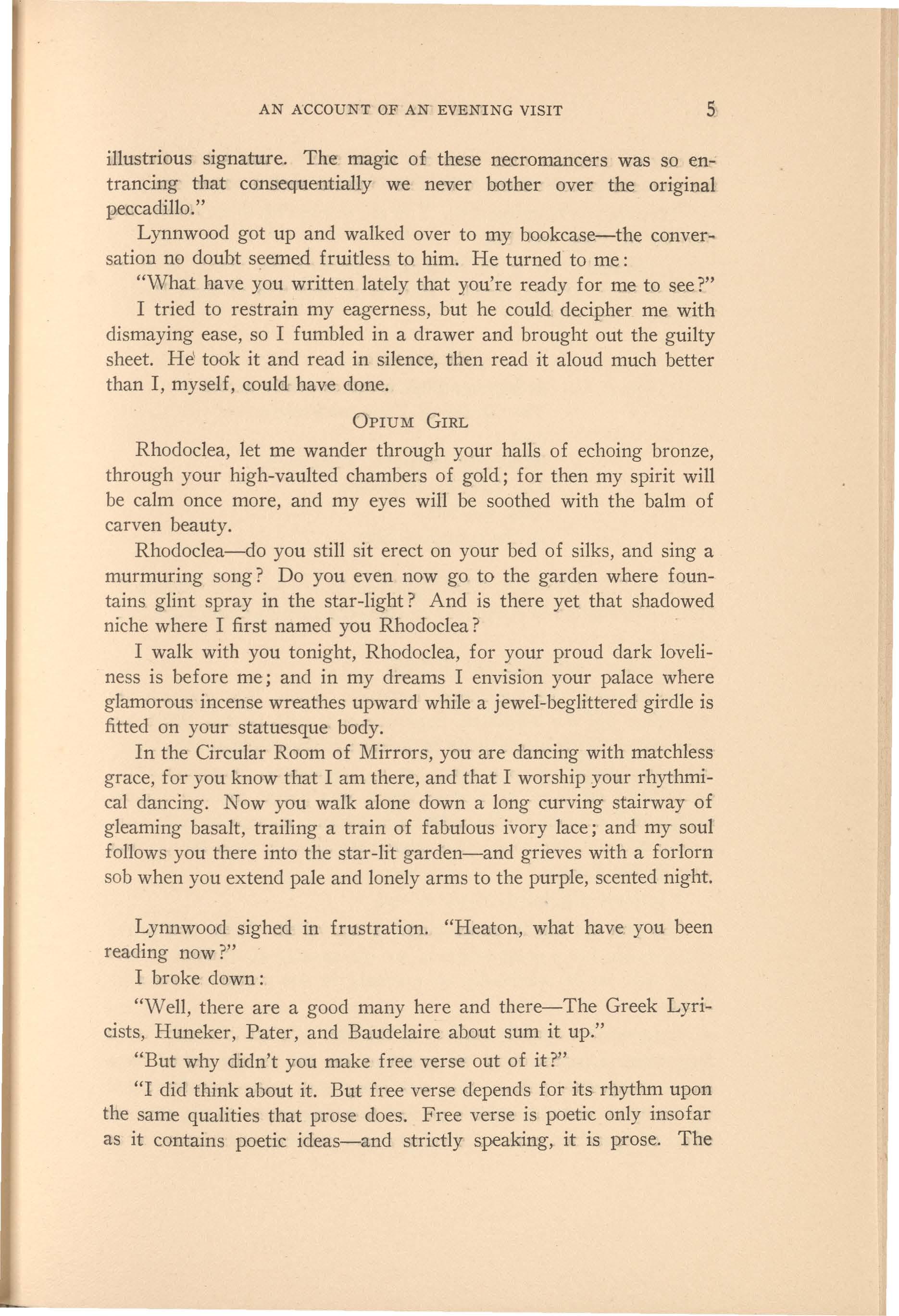
illustrious signature. The magic of these necromancers was so entrancing that consequentially we never bother over the original peccadillo."
Lynnwood got up and walked over to my bookcase-the conversation no doubt seemed fruitless to him. He turned to me :
"What have you written lately that you're ready for me to see?"
I tried to restrain my eagerness, but he could decipher me with dismaying ease, so I fumbled in a drawer and brought out the guilty sheet. He took it and read in silence, then read it aloud much better than I, myself, could have done.
OPIUM GIRL
Rhodoclea, let me wander through your halls of echoing bronze, through your high-vaulted chambers of gold; for then my spirit will be calm once more, and my eyes will be soothed with the balm of carven beauty.
Rhodoclea-clo you still sit erect on your bed of silks, and sing a murmuring song? Do you even now go to the garden where fountains glint spray in the star-light? And is there yet that shadowed niche where I first named you Rhodoclea?
I walk with you tonight, Rhodoclea, for your proud dark loveliness is before me; and in my dreams I envision your palace where glamorous incense wreathes upward while a jewel-beglittered girdle is fitted on your statuesque body.
In the Circular Room of Mirrors, you are dancing with matchless grace, for you know that I am there, and that I worship your rhythmical dancing. Now you walk alone down a long curving stairway of gleaming basalt, trailing a train of fabulous ivory lace; and my soul follows you there into the star-lit garden-and grieves with a forlorn sob when you extend pale and lonely arms to the purple, scented night.
Lynnwood sighed in frustration. "Heaton, what have you been reading now ?"
I broke down :
"Well, there are a good many here and there-The Greek Lyricists, Huneker, Pater, and Baudelaire about sum it up."
"But why didn't you make free verse out of it?"
"I did think about it. But free verse depends for its rhythm upon the same qualities that prose does. Free verse is poetic only insofar as it contains poetic ideas-and strictly speaking, it is prose. The

THE MESSENGER
plotting of irregular lines does not make poetry, you know, though the modernists don't seem to be able to grasp such a naive idea."
"Heaton, you're unbalanced. You are attempting to synthesize the theories of Pope and Poe. ."
I protested : "It is so obvious to arrange the words in those freakish lines. It's too simple. Here is an imitation of Ezra Pound. I made it last night :
RHOMANDEA
A fragile zephyr breathes gently across The Garden of Terraced Violets, And I Blindingly remember Rhomandea: The fainting fragrance That she left In the crumpled silks.
"Now," I elaborated, "that would make a very nice sentence in prose-the rhythm in it depends on elements entirely dissociated from poetry."
Lynnwood examined me pityingly.
"Well, well," he applauded ironically. Then, "Do you not see that what you are tentatively experimenting with is that which has been called 'the concrete juice of literature, the essential oil of art,' the prose poem? It is a form set by its master, Baudelaire. He dreamed of an ideal : of a prose which 'was poetic, musical without rhythm and without rhyme, subtle and staccato enough to follow the lyric motions of the soul.' It is supremely difficult, thus far possible only by the French."
I grinned delightedly.
"So you did finally understand," I marvelled. "Yes, that is the classification for a prose which is not conceivably an attempt at vers libre, and yet is manifestly an anomaly in the world of accepted prose."
Lynnwood resignedly stabbed at the fire. \Ve sat in silence for a long time. Unconsciously we gazed at the cat as she rested on a large, voluptuous pillow. She was lying with polite comfort; and the nicely curved tail added a perfect finishing caress to the enviable effect of contained ease. The velvety ears twitched electrically, while
the long, sensitive antennae alertly tested the air; her soft black belly expanded and relaxed with each measured breathing-her eyes were inscrutably veiled as we examined her and wondered about cats. . . .
Soon she became aware of our attention, and arose with fascinating grace , made a swift dressing-stroke down her glossy flanks, passed her mocking eyes over us, disdainfully turned her back-and walked away with the balanced movement and aloof unconcern of a successful actress.
Lynnwood and I looked rather helplessly at each other when she was gone, and I remembered what Edgar Saltus had written about the sphinx of the fireside.
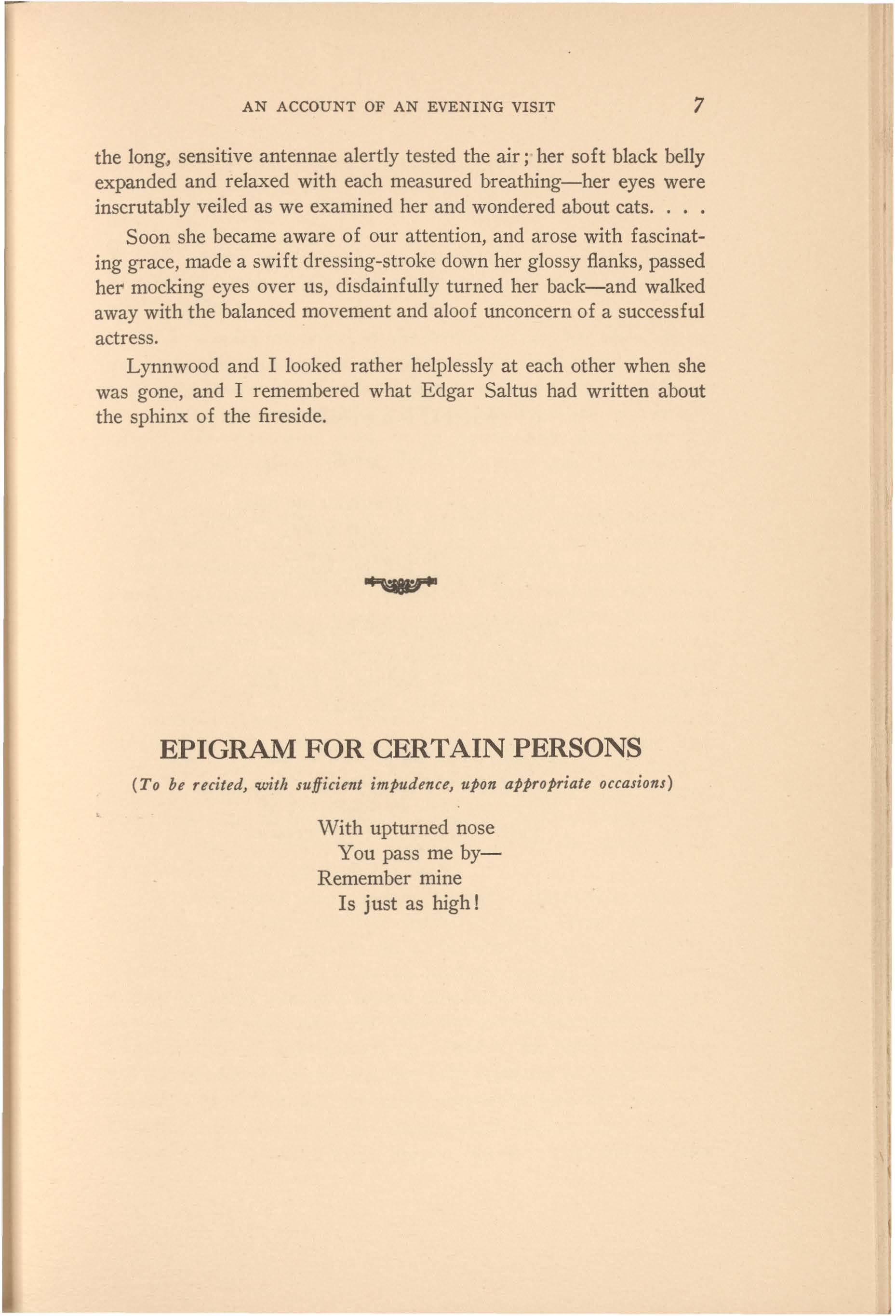
EPIGRAM FOR CERTAIN PERSONS
(To be recited, with sufficient impudence, upon appropriate occasions)
With upturned nose You pass me byRemember mine Is just as high!
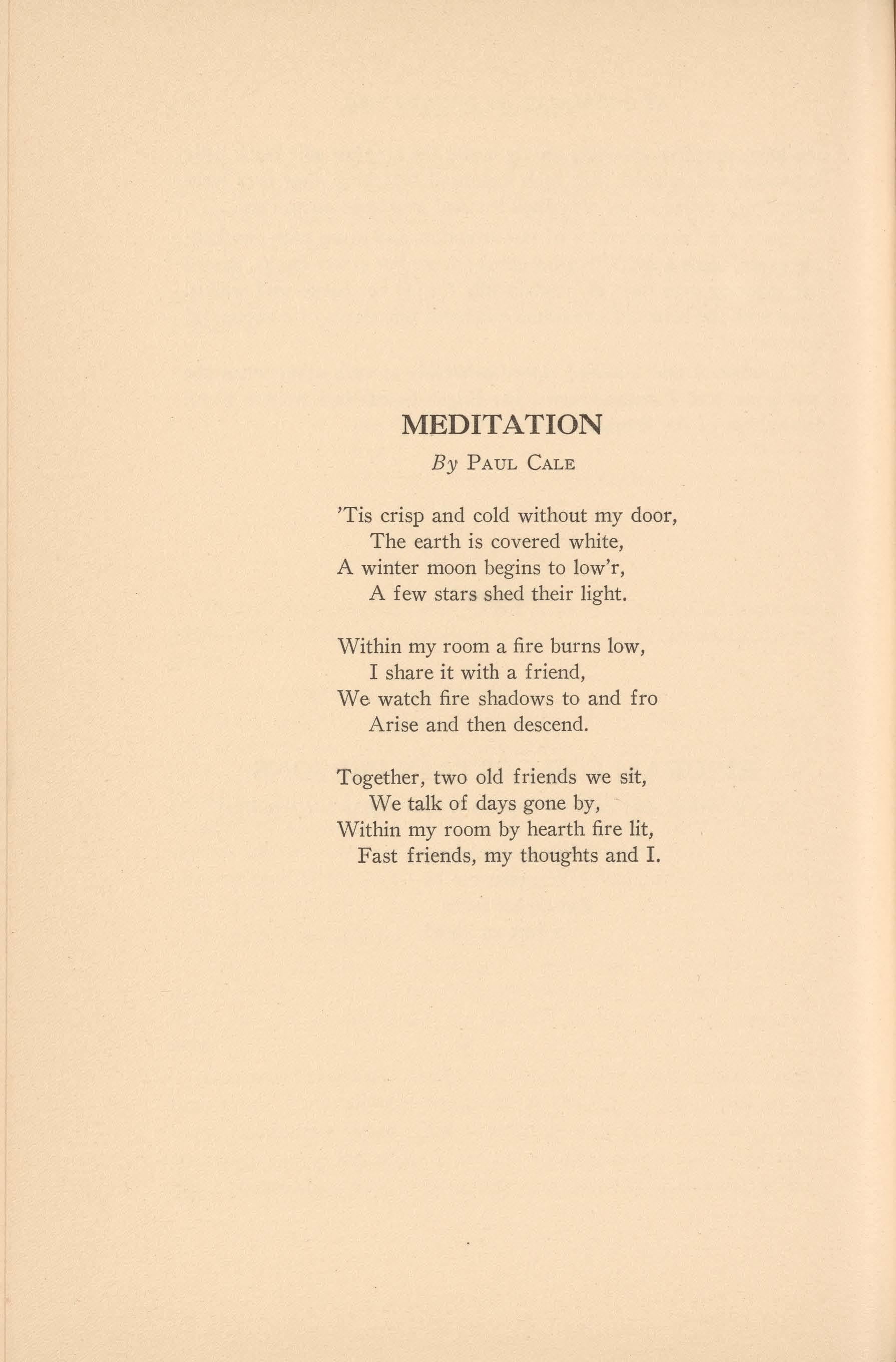
MEDITATION
By PAUL CALE
'Tis crisp and cold without my door, The earth is covered white, A winter moon begins to low'r, A few stars shed their light.
Within my room a fire burns low, I share it with a friend, We watch fire shadows to and fro Arise and then descend.
Together, two old friends we sit, We talk of days gone by, Within my room by hearth fire lit, Fast friends, my thoughts and I.
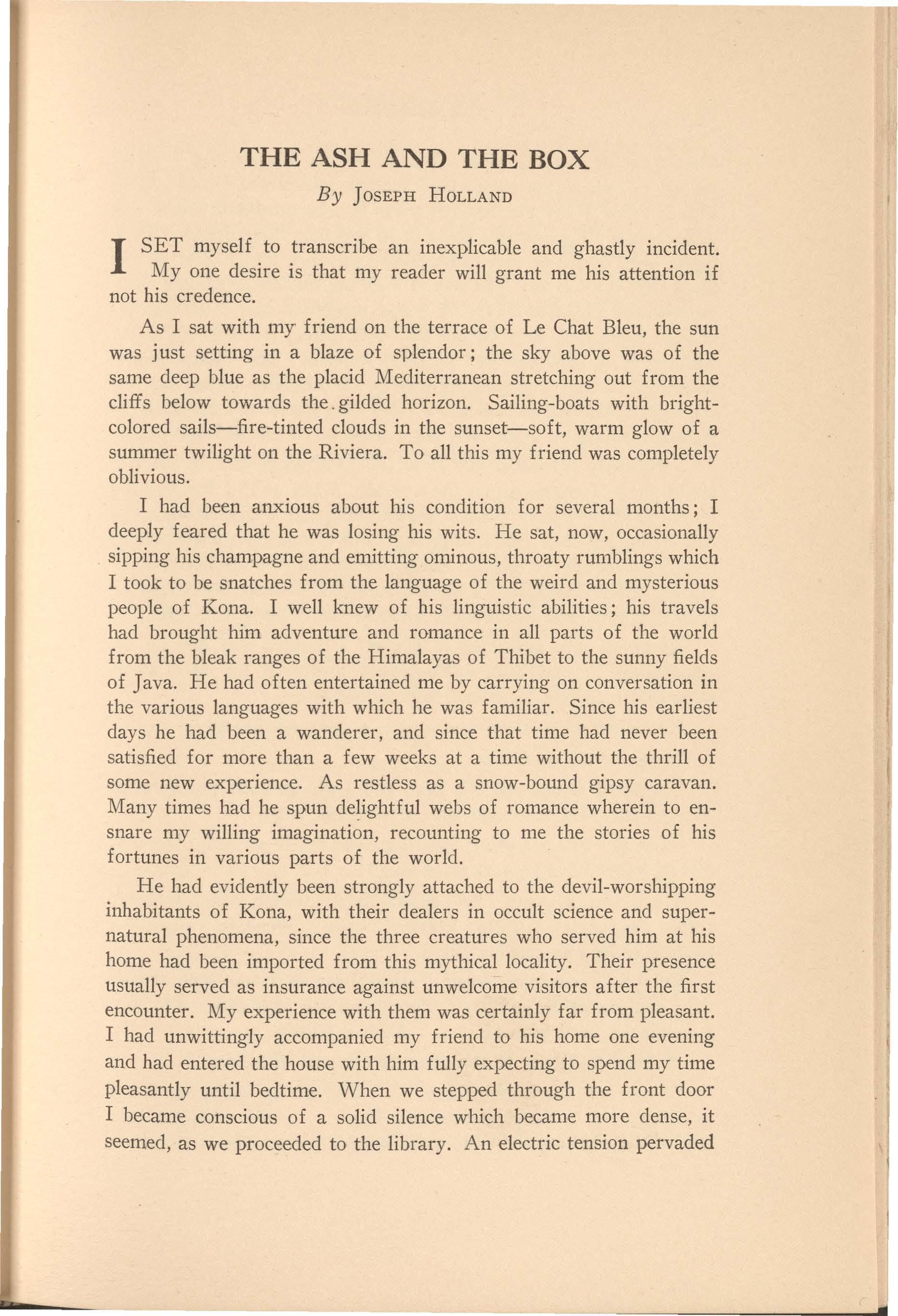
THE ASH AND THE BOX
By JOSEPH HOLLAND
ISET myself to transcribe an inexplicable and ghastly incident. My one desire is that my reader will grant me his attention if not his credence.
As I sat with my friend on the terrace of Le Chat Bleu, the sun was just setting in a blaze of splendor; the sky above was of the same deep blue as the placid Mediterranean stretching out from the cliffs below towards the . gilded horizon. Sailing-boats with brightcolored sails-fire-tinted clouds in the sunset-soft, warm glow of a summer twilight on the Riviera. To all this my friend was completely oblivious.
I had been anxious about his condition for several months; I deeply feared that he was losing his wits. He sat, now, occasionally sipping his champagne and emitting ominous, throaty rumblings which I took to be snatches from the language of the weird and mysterious people of Kona. I well knew of his linguistic abilities; his travels had brought him adventure and romance in all parts of the world from the bleak ranges of the Himalayas of Thibet to the sunny fields of Java. He had often entertained me by carrying on conversation in the various languages with which he wa s familiar. Since his earliest days he had been a wanderer, and since that time had never been satisfied for more than a few weeks at a time without the thrill of some new experience. As restless as a snow-bound gipsy caravan. Many times had he spun delightful webs of romance wherein to ensnare my willing imaginati on, recounting to me the stories of his fortunes in various parts of the world.
He had evidently been strongly attached to the devil-worshipping inhabitants of Kona, with their dealers in occult science and supernatural phenomena, since the three creature s who served him at his home had been imported from this mythical locality. Their presence usually served as insurance against unwelcome visitors after the first encounter. My experience with them was certainly far from pleasant. I had unwittingly accompanied my friend to his home one evening and had entered the house with him fully expecting to spend my time pleasantly until bedtime. When we stepped through the front door I became conscious of a solid silence which became more dense, it seemed, as we proceeded to the library. An electric tension pervaded
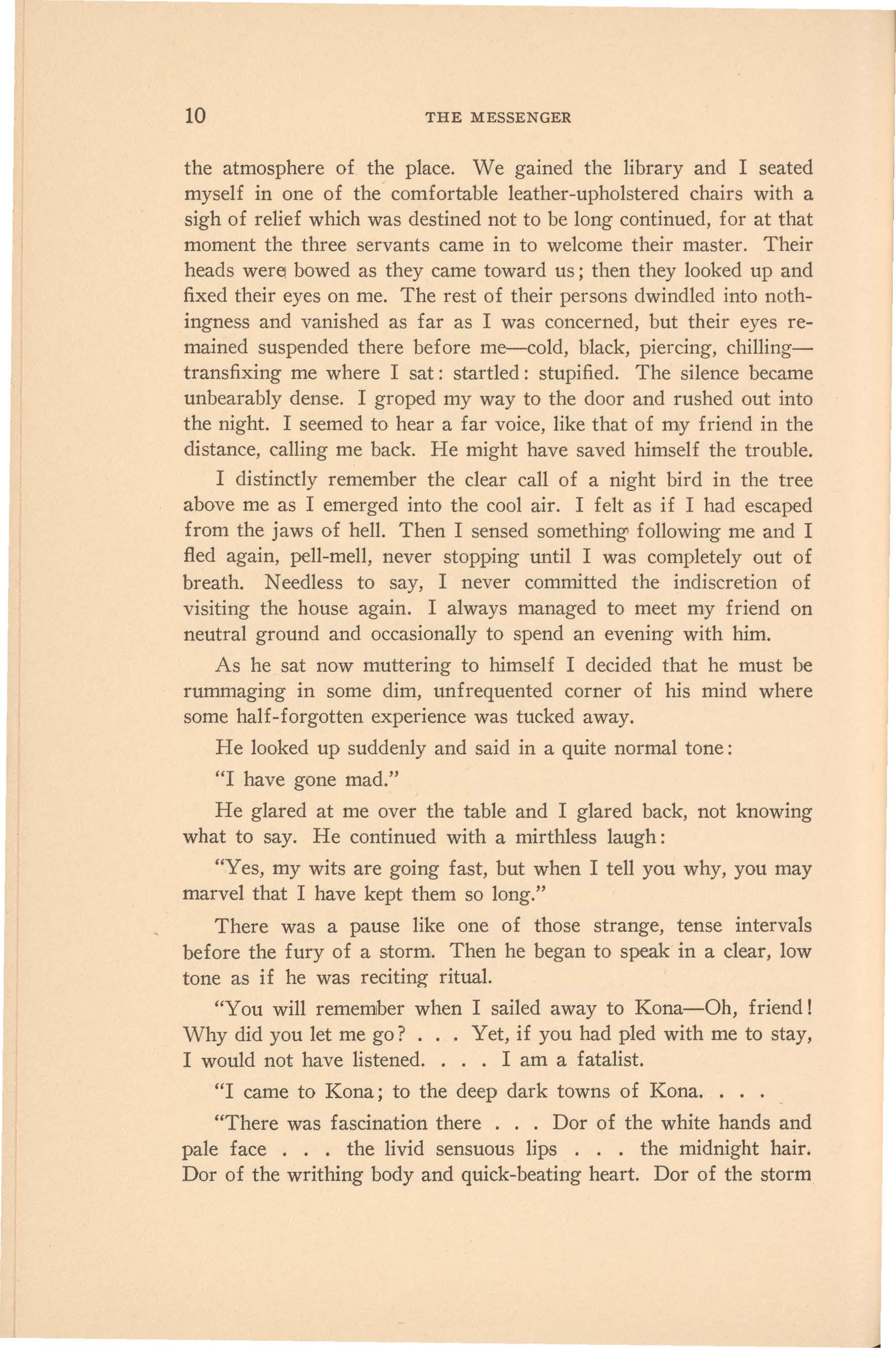
THE MESSENGER
the atmosphere of the place. We gained the library and I seated myself in one of the comfortable leather-upholstered chairs with a sigh of relief which was destined not to be long continued, for at that moment the three servants came in to welcome their master. Their heads wen:1bowed as they came toward us; then they looked up and fixed their eyes on me. The rest of their persons dwindled into nothingness and vanished as far as I was concerned, but their eyes remained suspended there before me-cold, black, piercing, chillingtransfixing me where I sat: startled: stupified. The silence became unbearably dense. I groped my way to the door and rushed out into the night. I seemed to hear a far voice, like that of my friend in the distance, calling me back. He might have saved himself the trouble.
I distinctly remember the clear call of a night bird in the tree above me as I emerged into the cool air. I felt as if I had escaped from the jaws of hell. Then I sensed something following me and I fled again, pell-mell, never stopping until I was completely out of breath. Needless to say, I never committed the indiscretion of visiting the house again. I always managed to meet my friend on neutral ground and occasionally to spend an evening with him.
As he sat now muttering to himself I decided that he must be rummaging in some dim, unfrequented corner of his mind where some half-forgotten experience was tucked away.
He looked up suddenly and said in a quite normal tone :
"I have gone mad."
He glared at me over the table and I glared back, not knowing what to say. He continued with a mirthless laugh:
"Yes, my wits are going fast, but when I tell you why, you may marvel that I have kept them so long."
There was a pause like one of those strange, tense intervals before the fury of a storm. Then he began to speak in a clear, low tone as if he was reciting ritual.
"You will remember when I sailed away to Kona-Oh, friend! Why did you let me go? . . . Yet, if you had pled with me to stay, I would not have listened. . . . I am a fatalist.
"I came to Kona; to the deep dark towns of Kona.
"There was fascination there Dor of the white hands and pale face the livid sensuous lips the midnight hair. Dor of the writhing body and quick-beating heart. Dor of the storm
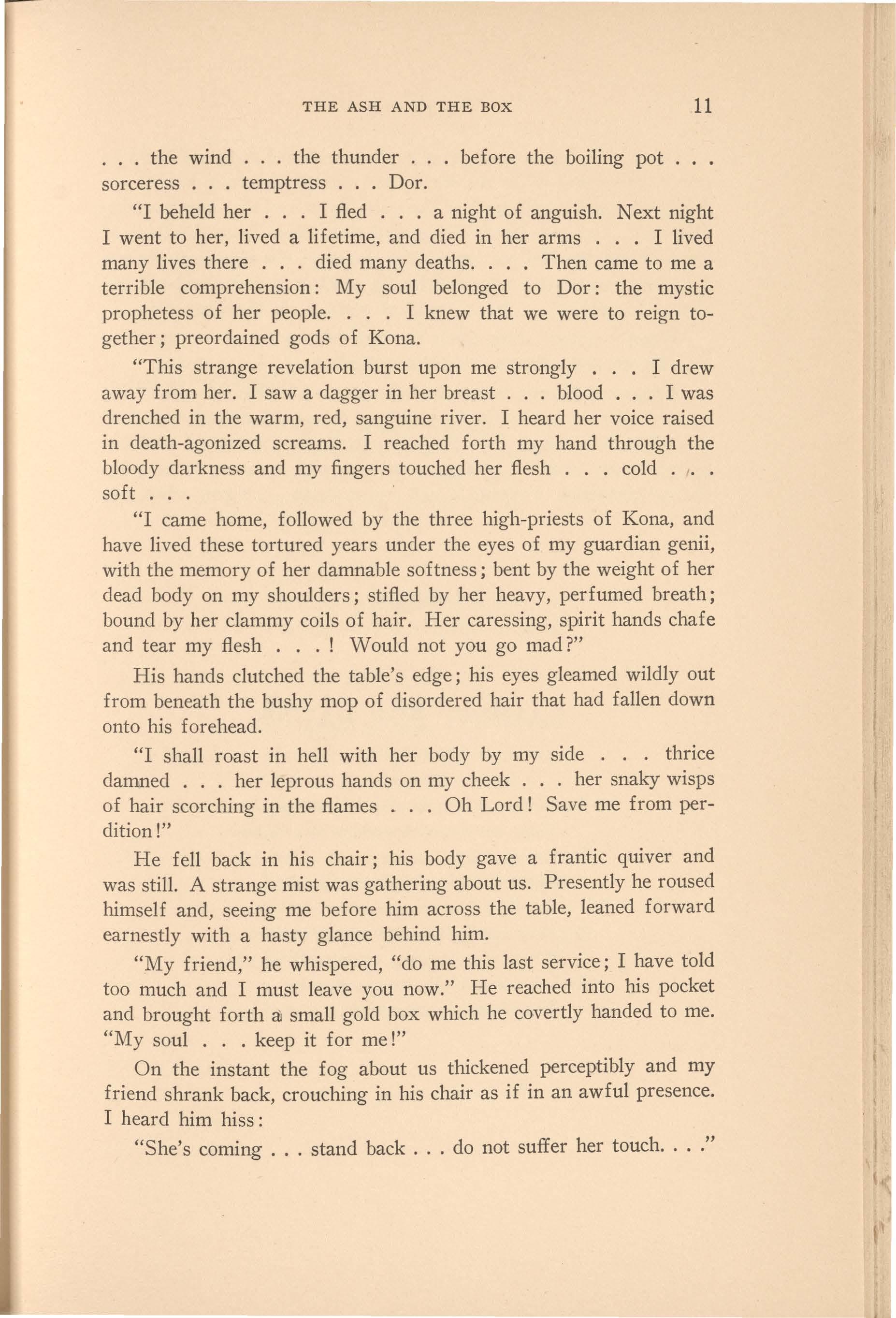
the wind the thunder before the boiling pot sorceress ... temptress ... Dor.
"I beheld her ... I fled ... a night of anguish. Next night I went to her, lived a lifetime, and died in her arms . . . I lived many lives there died many deaths. Then came to me a terrible comprehension: My soul belonged to Dor: the mystic prophetess of her people. I knew that we were to reign together; preordained gods of Kona.
"This strange revelation burst upon me strongly . . . I drew away from her. I saw a dagger in her breast ... blood ... I was drenched in the warm, red, sanguine river. I heard her voice raised in death-agonized screams. I reached forth my hand through the bloody darkness and my fingers touched her flesh . . . cold . . . soft ...
"I came home, followed by the three high-priests of Kona, and have lived these tortured years under the eyes of my guardian genii, with the memory of her damnable softness; bent by the weight of her dead body on my shoulders; stifled by her heavy, perfumed breath; bound by her clammy coils of hair. Her caressing, spirit hands chafe and tear my flesh ! Would not you go mad ?"
His hands clutched the table's edge; his eyes gleamed wildly out from beneath the bushy mop of disordered hair that had fallen down onto his forehead.
"I shall roast in hell with her body by my side . . . thrice damned . . . her leprous hands on my cheek . . . her snaky wisps of hair scorching in the flames Oh Lord ! Save me from perdition!"
He fell back in his chair; his body gave a frantic quiver and was still. A strange mist was gathering about us . Presently he roused himself and, seeing me before him across the table, leaned forward earnestly with a hasty glance behind him.
"My friend," he whispered, "do me this last service; I have told too much and I must leave you now." He reached into his pocket and brought forth al small gold box which he covertly handed to me. "My soul keep it for me!"
On the instant the fog about us thickened perceptibly and my friend shrank back, crouching in his chair as if in an awful presence. I heard him hiss:
"She's coming stand back do not suffer her touch "
THE MESSENGER
Whether it was a product of my overwrought imagination or an actual occurrence I do not know, but out of the mist behind my friend emerged a dark cloaked shadow. My friend was now moaning piteously. Two pale hands disengaged themselves from the folds of the robe and reached out toward the throat of the man opposite me. The livid visage of a woman with jet black hair and blood-red lips shone out suddenly. I felt a breath of wind I closed my eyes
When I opened them again the mist was gone . . . the chair opposite me was empty I was alone.
Afterward I went to my friend's home. He was not there. He never returned ; neither did the priests of Kona. There only remained the golden box which I carried away from the restaurant clutched tightly in my hand. I became consumed with curiosity as to what the box contained. I opened it, and found inside ... a grey-white ash.
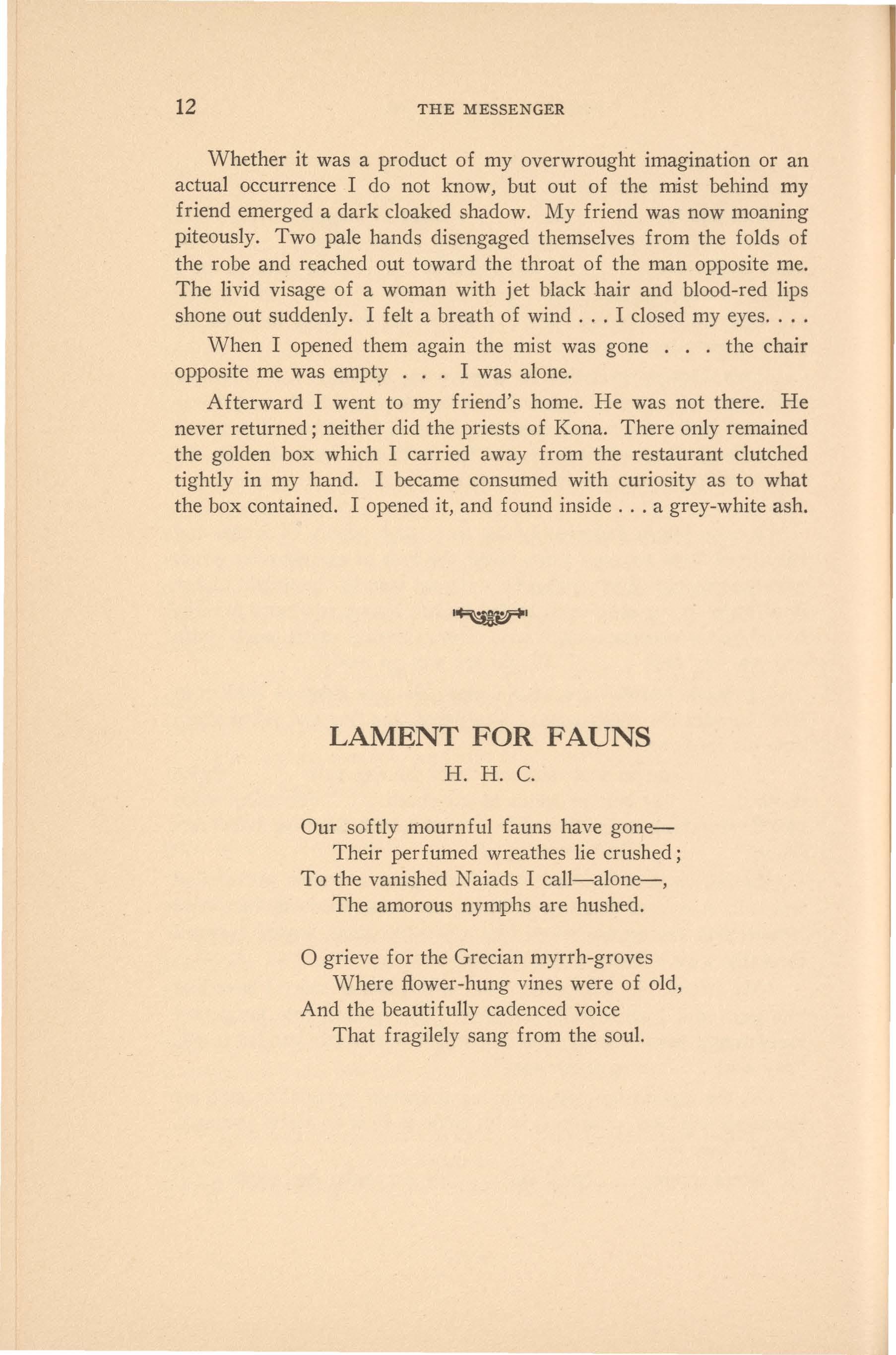
LAMENT FOR FAUNS
H. H. C.
Our softly mournful fauns have goneTheir perfumed wreathes lie crushed; To the vanished Naiads I call-alone-, The amorous nymphs are hushed.
0 grieve for the Grecian myrrh-groves
Where flower-hung vines were of old, And the beautifully cadenced voice That fragilely sang from the soul.
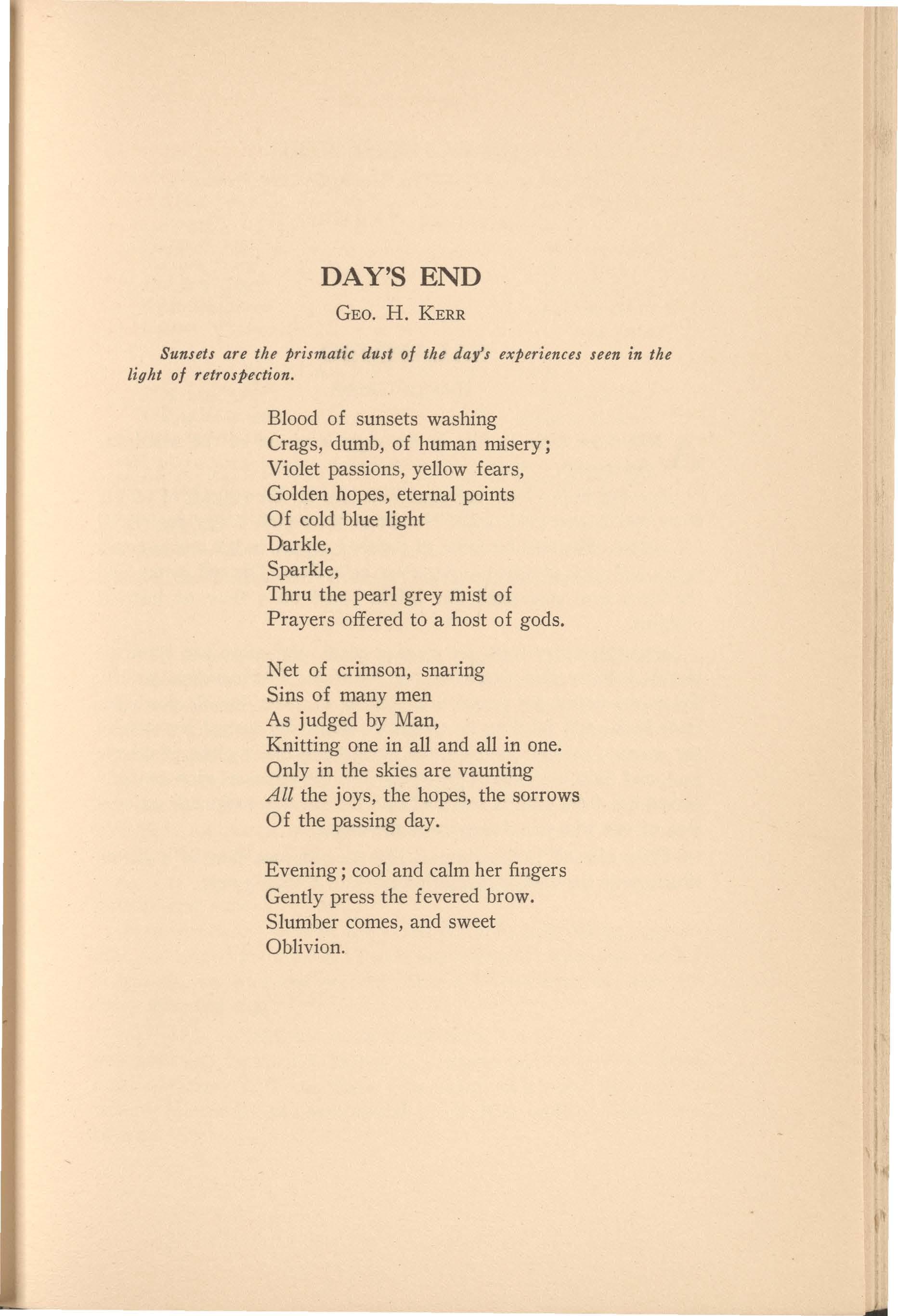
DAY'S END
GEO. H. KERR
Sunsets are the prismatic dust of the day's experiences seen in the light of retrospection.
Blood of sunsets washing Crags, dumb, of human misery; Violet passions, yellow fears, Golden hopes, eternal points Of cold blue light Darkle, Sparkle, Thru the pearl grey mist of Prayers offered to a host of gods.
Net of crimson, snaring Sins of many men
As judged by Man, Knitting one in all and all in one. Only in the skies are vaunting All the joys, the hopes, the sorrows Of the passing day.
Evening; cool and calm her fingers Gently press the fevered brow. Slumber comes, and sweet Oblivion.
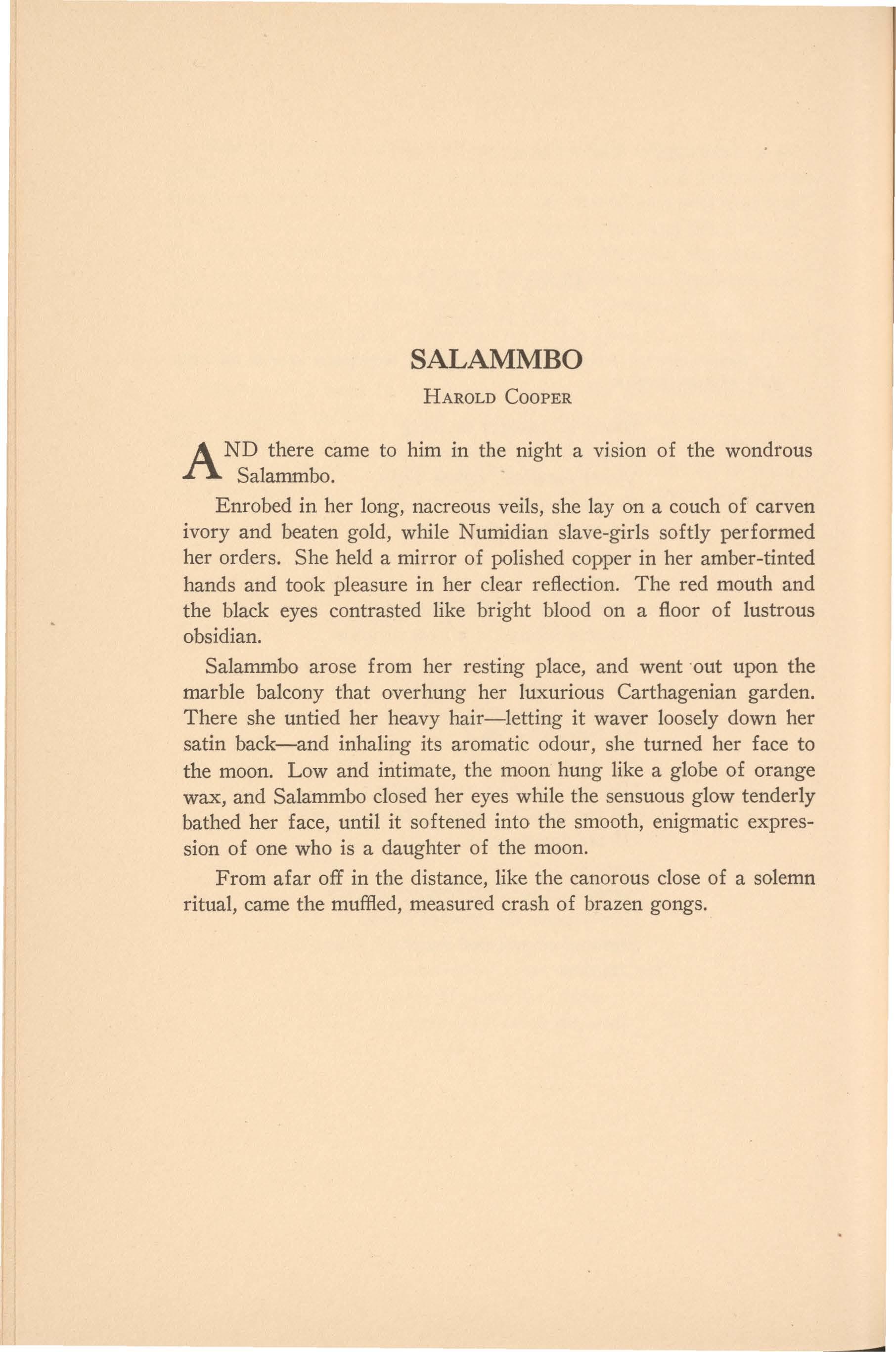
SALAMMBO
HAROLD COOPER
AND there came to him in the night a vision of the wondrous Salammbo.
Enrobed in her long, nacreous veils, she lay on a couch of carven ivory and beaten gold, while Numidian slave-girls softly performed her orders. She held a mirror of polished copper in her amber-tinted hands and took pleasure in her clear reflection The red mouth and the black eyes contrasted like bright blood on a floor of lustrous obsidian.
Salammbo arose from her resting place, and went out upon the marble balcony that overhung her luxurious Carthagenian garden. There she untied her heavy hair-letting it waver loosely down her satin back-and inhaling its aromatic odour, she turned her face to the moon. Low and intimate, the moon hung like a globe of orange wax, and Salammbo closed her eyes while the sensuous glow tenderly bathed her face, until it softened into the smooth, enigmatic expression of one who is a daughter of the moon.
From afar off in the distance, like the canorous close of a solemn ritual, came the muffled, measured crash of brazen gongs.
THE MESSENGER
Member Intercollegiate Press Association of Virginia
RICHMOND COLLEGE
H. G. KINCHELOE
THOMAS DUKE
WILLIAM BERRY
YANK BAITIATO
LUTHER WELLS
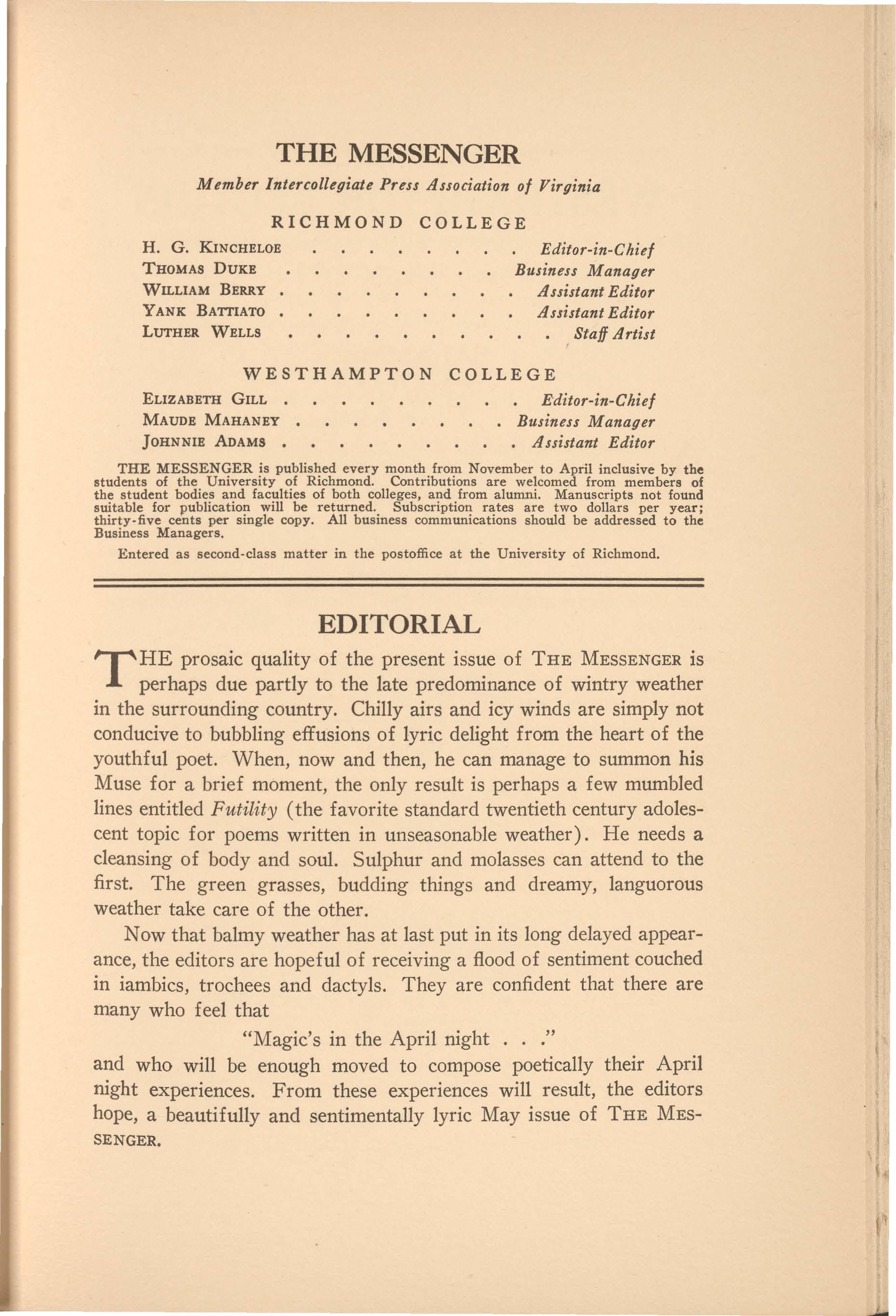
Editor-in-Chief
Business Manager
Assistant Editor
Assistant Editor
Staff Artist
WESTHAMPTON COLLEGE
ELIZABETHGILL
MAUDE MAHANEY •
JOHNNIE ADAMS •
Editor-in-Chief
• Business Manager
• Assistant Editor
THEMESSENGER is publishedeverymonthfromNovember to Aprilinclusiveby the studentsof the Universityof Richmond.Contributionsare welcomedfrommembersof the studentbodiesand facultiesof bothcolleges,andfromalumni.Manuscriptsnot found suitablefor publicationwill be returned. Subscriptionrates are two dollarsper year; thirty-fivecentsper singlecopy. Allbusinesscommunicationsshouldhe addressedto the BusinessManagers.
Enteredas second-classmatterin the postoffice at the Universityof Richmond.
EDITORIAL
THE prosaic quality of the present issue of THE MESSENGER is perhaps due partly to the late predominance of wintry weather in the surrounding country. Chilly airs and icy winds are simply not conducive to bubbling effusions of lyric delight from the heart of the youthful poet. When, now and then, he can manage to summon his Muse for a brief moment, the only result is perhaps a few mumbled lines entitled Futility ( the favorite standard twentieth century adolescent topic for poems written in unseasonable weather). He needs a cleansing of body and soul. Sulphur and molasses can attend to the first. The green grasses, budding things and dreamy, languorous weather take care of the other.
Now that balmy weather has at last put in its long delayed appearance, the editors are hopeful of receiving a flood of sentiment couched in iambics, trochees and dactyls. They are confident that there are many who feel that
"Magic's in the April night ." and who will be enough moved to compose poetically their April night experiences. From these experiences will result, the editors hope, a beautifully and sentimentally lyric May issue of THE MESSENGER.

FUTILITY
HATTIE HABEL
I reach out an avaricious hand And clutch the thin veil of nothingness.
I stare intently until my eyeballs burn And try to fathom hidden immensities, But my mind fails me utterly And my thoughts wander far away.
The physical power in my hands Actuates me to a vain struggle With the insurmountable forces Pressing relentlessly upon me.
I beat at the air fruitlessly, Wasting energy in hopeless invective, And tho the goal ever looms temptingly near, I never leave my starting place.
The tumult of rebellion surges within, But the hoped-for release never comes. Gradually it subsides, leaving me Wallowing in a black pool of cynicism.
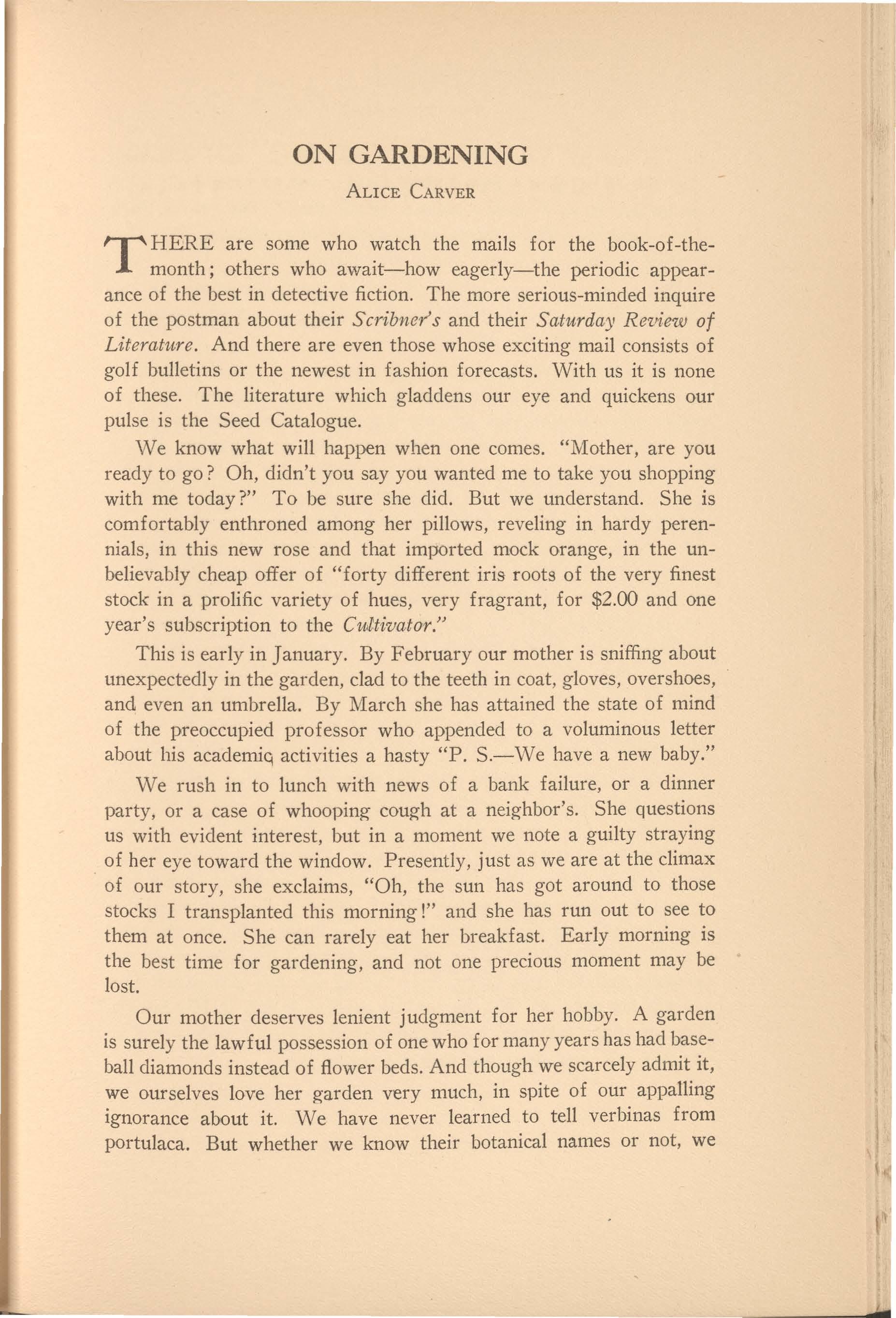
ON GARDENING
ALICE CARVER
THERE are some who watch the mails for the book-of-themonth; others who await-how eagerly-the periodic appearance of the best in detective fiction. The more serious-minded inquire of the postman about their Scribner's and their Saturday Review of Literature. And there are even those whose exciting mail consists of golf bulletins or the newest in fashion forecasts. With us it is none of these. The literature which gladdens our eye and quickens our pulse is the Seed Catalogue.
We know what will happen when one comes. "Mother, are you ready to go? Oh, didn't you say you wanted me to take you shopping with me today?" To be sure she did. But we understand. She is comfortably enthroned among her pillows, reveling in hardy perennials, in this new rose and that imported mock orange, in the unbelievably cheap offer of "forty different iris roots of the very finest stock in a prolific variety of hues, very fragrant, for $2.00 and one year's subscription to the Cultivator."
This is early in January. By February our mother is sniffing about unexpectedly in the garden, clad to the teeth in coat , gloves, overshoes, and even an umbrella. By March she has attained the state of mind of the preoccupied professor who appended to a voluminous letter about his academiq activities a hasty "P. S.-We have a new baby."
We rush in to lunch with news of a bank failure, or a dinner party, or a case of whooping cough at a neighbor's. She questions us with evident interest, but in a moment we note a guilty straying of her eye toward the window. Presently, just as we are at the climax of our story, she exclaims, "Oh, the sun has got around to those stocks I transplanted this morning!" and she has run out to see to them at once. She can rarely eat her breakfast. Early morning is the best time for gardening, and not one precious moment may be lost.
Our mother deserves lenient judgment for her hobby. A garden is surely the lawful possession of one who for many years has had baseball diamonds instead of flower beds. And though we scarcely admit it, we ourselves love her garden very much, in spite of our appalling ignorance about it. '1\Te have never learned to tell verbinas from portulaca. But whether we know their botanical names or not, we

THE MESSENGER
glory in the tall, waxy, lavender iris that fill the yard with their fragrance in the first golden spring days, and in the rose-pink tulips that beckon in so French a manner beside them. The yellow flame of the forsythias, like a harmonious anthem of exultation, lives with us when we may no longer see it with outward eyes.
Her garden is, to our mother, a sort of sanctuary where she may withdraw and find comfort, and beauty, and joyous activity-shall we not then say where she may find God?
Nor that her garden is a spot for vague and passive dreaming. One could hardly imagine a figure more actively belligerent than our mother when she is in her pursuit of a mole. Like Lord Emsworth, she "would pour whale-oil solution on her grandmother if she found her sucking the juice from the under side of a rose leaf." She is, you understand, an honest-to-goodness gardener; none of your dilettantes who, to follow the prevailing mode, speak often of "my garden," and employ nurserymen to put them out an indiscriminate melee of shrubs and evergreens. We know them. Their hands are white. Now our mother has been known to spend eight hours a day a-gardening, and by summer she is tanned and sinewy and roughened until it is a family joke. She cannot quite balance the scales at ninety-five, but she can dig seventy feet of four-foot border two and a half feet deep, or transplant a young fruit tree if there is need. Fruit tree-I've no doubt but that she could move an oak, if she thought it was not properly placed for the beauty of the garden.
It is in vigorous activity that the true recreation of gardening is found. One may have withal solitude, and quiet, and steady unhurriedness. One works hard and long, surrounded by loveliness, breathing in the clean smell of fresh earth. One grows weary. What, then, if a letter has come from one's son and daughter saying that science has failed most inopportunely? What if the idolized grandbaby has had fever above a hundred, no one knows why, for the third successive night? What if the milk man bungled the order again this morning, and the cook didn't come for all her fine promises? One has still the certainty that the God of gardens is still in His heaven. One has still a delicious, over-mastering tiredness of body. And so one may rest, and sleep, and expect a better day.
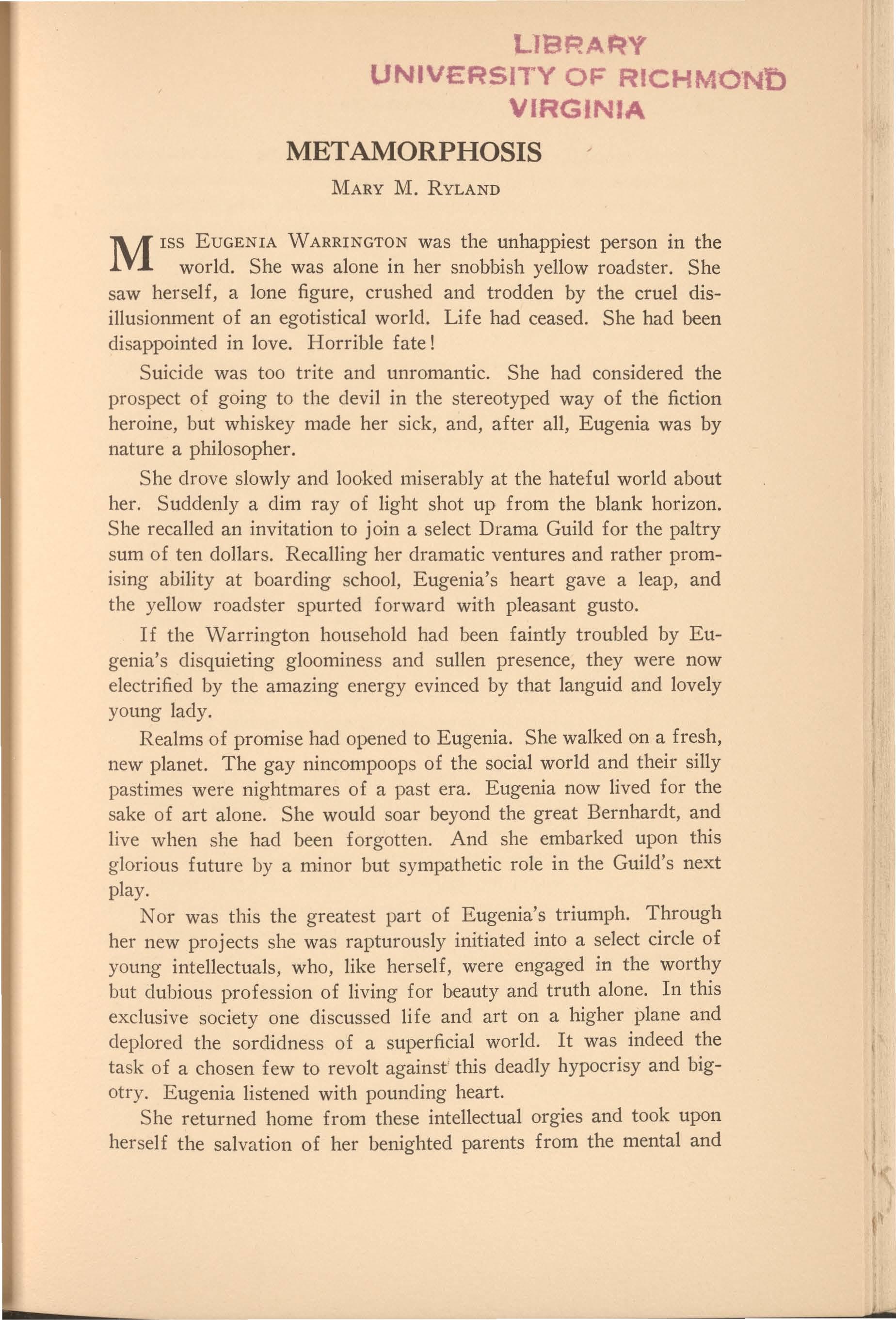
UNIVERSITY OF RICHMOND VIRGINIA
METAMORPHOSIS
MARY M. RYLAND
Mrss EUGENIA WARRINGTONwas the unhappiest person in the world. She was alone in her snobbish yellow roadster. She saw herself, a lone figure, crushed and trodden by the cruel disillusionment of an egotistical world. Life had ceased. She had been disappointed in love. Horrible fate!
Suicide was too trite and unromantic. She had considered the prospect of going to the devil in the stereotyped way of the fiction heroine, but whiskey made her sick, and, after all, Eugenia was by nature a philosopher.
She drove slowly and looked miserably at the hateful world about her. Suddenly a dim ray of light shot up from the blank horizon. She recalled an invitation to join a select Drama Guild for the paltry sum of ten dollars. Recalling her dramatic ventures and rather promising ability at boarding school, Eugenia's heart gave a leap, and the yellow roadster spurted forward with pleasant gusto.
If the Warrington household had been faintly troubled by Eugenia's disquieting gloominess and sullen presence, they were now electrified by the amazing energy evinced by that languid and lovely young lady.
Realms of promise had opened to Eugenia. She walked on a fresh, new planet. The gay nincompoops of the social world and their silly pastimes were nightmares of a past era. Eugenia now lived for the sake of art alone. She would soar beyond the great Bernhardt, and live when she had been forgotten. And she embarked upon this glorious future by a minor but sympathetic role in the Guild's next play.
Nor was this the greatest part of Eugenia's triumph. Through her new projects she was rapturously initiated into a select circle of young intellectuals, who, like herself, were engaged in the worthy but dubious profession of living for beauty and truth alone. In this exclusive society one discussed life and art on a higher plane and deplored the sordidness of a superficial world. It was indeed the task of a chosen few to revolt against' this deadly hypocrisy and bigotry. Eugenia listened with pounding heart.
She returned home from these intellectual orgies and took upon herself the salvation of her benighted parents from the mental and
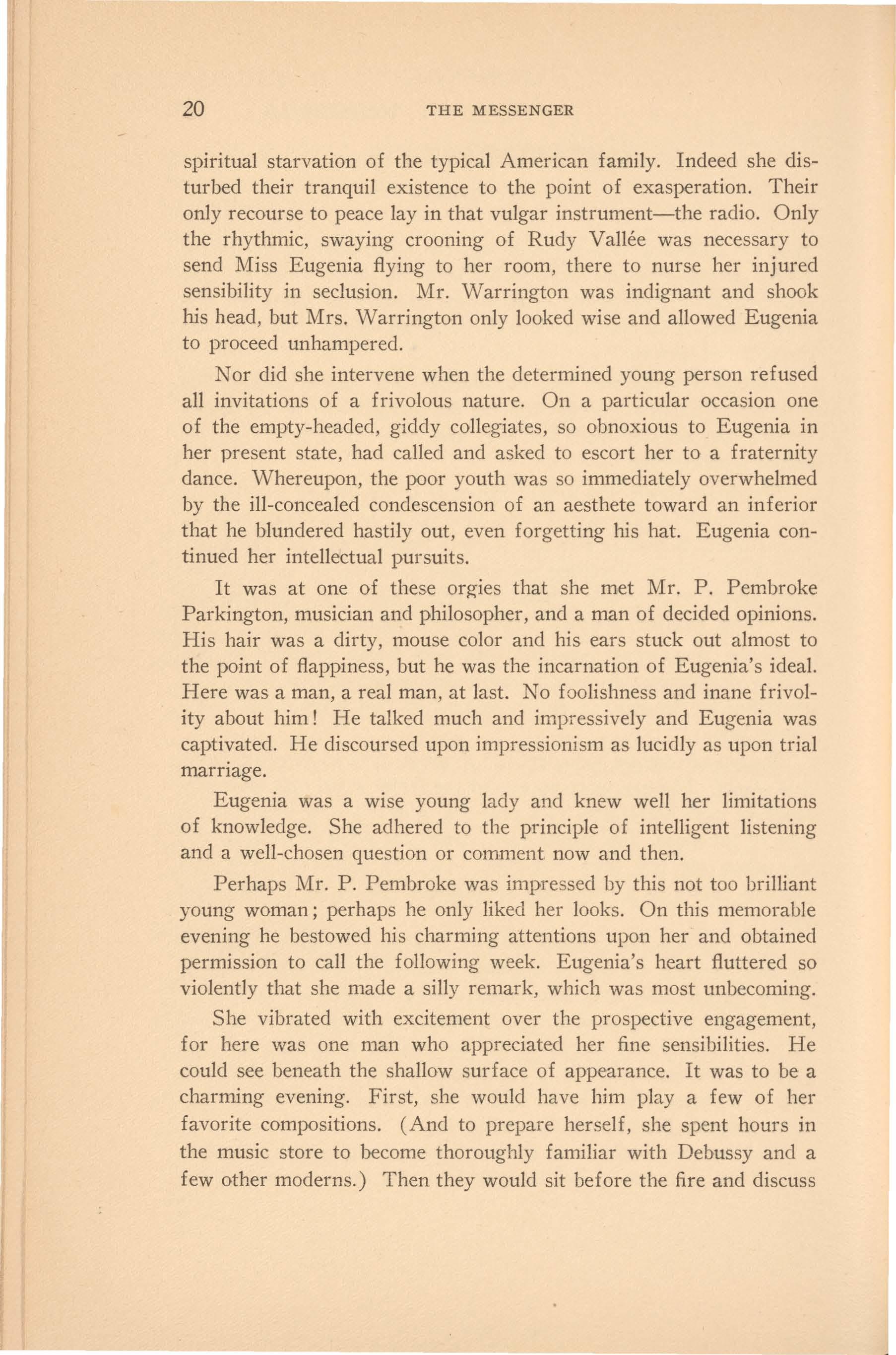
THE MESSENGER
spiritual starvation of the typical American family. Indeed she disturbed their tranquil existence to the point of exasperation. Their only recourse to peace lay in that vulgar instrument-the radio. Only the rhythmic, swaying crooning of Rudy Vallee was necessary to send Miss Eugenia flying to her room, there to nurse her injured sensibility in seclusion. Mr. Warrington was indignant and shook his head, but Mrs. Warrington only looked wise and allowed Eugenia to proceed unhampered.
Nor did she intervene when the determined young person refused all invitations of a frivolous nature. On a particular occasion one of the empty-headed, giddy collegiates, so obnoxious to Eugenia in her present state, had called and asked to escort her to a fraternity dance. Whereupon, the poor youth was so immediately overwhelmed by the ill-concealed condescension of an aesthete toward an inferior that he blundered hastily out, even forgetting his hat. Eugenia continued her intellectual pursuits.
It was at one of these orgies that she met Mr. P. Pembroke Parkington, musician and philosopher, and a man of decided opinions. His hair was a dirty, mouse color and his ears stuck out almost to the point of flappiness, but he was the incarnation of Eugenia's ideal. Here was a man, a real man, at last. No foolishness and inane frivolity about him! He talked much and impressively and Eugenia was captivated. He discoursed upon impressionism as lucidly as upon trial marriage.
Eugenia was a wise young lady and knew well her limitations of knowledge. She adhered to the principle of intelligent listening and a well-chosen question or comment now and then.
Perhaps Mr. P. Pembroke was impre ssed by this not too brilliant young woman ; perhaps he only liked her looks. On this memorable evening he bestowed his charming attentions upon her and obtained permission to call the following week. Eugenia's heart fl.uttered so violently that she made a silly remark, which was most unbecoming.
She vibrated with excitement over the prospective engagement, for here was one man who appreciated her fine sensibilities. He could see beneath the shallow surface of appearance. It was to be a charming evening. First, she would have him play a few of her favorite compositions. (And to prepare herself, she spent hours in the music store to become thoroughly familiar with Debussy and a few other moderns.) Then they would sit before the fire and discuss
their favorite books. ( She felt relatively safe on this ground since she diligently read book reviews.) As the crowning summit of their conversation she would tell of her ambition, her promising ability; she would invite him to the next brilliant production.
Poor Parkington ! What a pity that he was not endowed with that rare gift of psychological divination. Here was the chance of his lifetime; the opportunity for his genius to burst into flower; to be an heroic figure. But it was not to be.
The great evening arrived and with it P. Pembroke Parkington, armed with the prospect of jubilee. He was greeted by Miss Eugenia radiant and charming in a new gown and with a rare gem of wit upon her lips. But her triumph, like that of Caesar, was short-lived.
The words of wisdom which fell from his lips were these :
"Hurry and get your coat, lovely. We'll go to the early show and dash over to my fraternity house afterwards and dance until the sun rises."
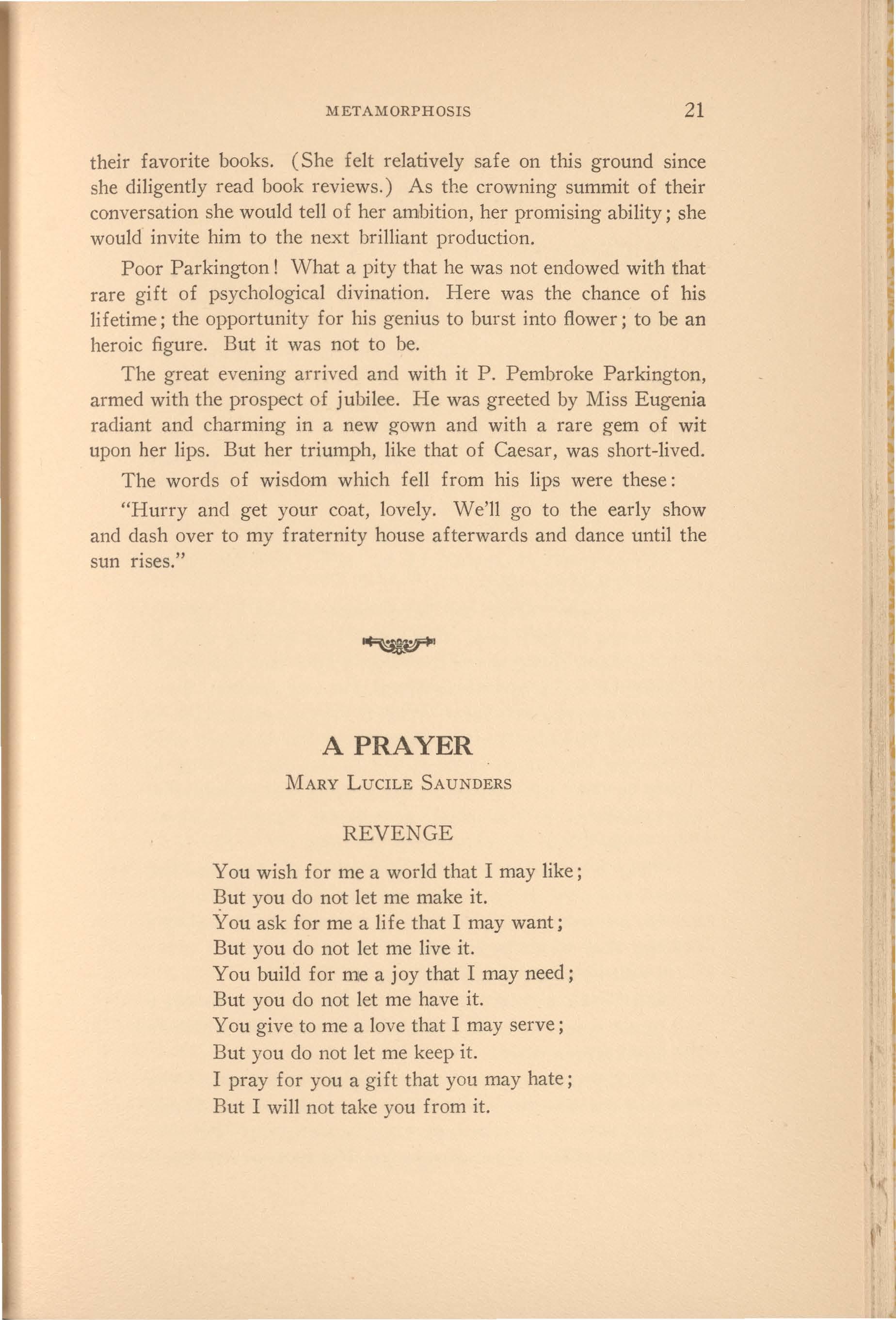
A PRAYER
MARY LUCILE SAUNDERS
REVENGE
You wish for me a world that I may like; But you do not let me make it.
You ask for me a life that I may want; But you do not let me live it.
You build for me a joy that I may need; But you do not let me have it.
You give to me a love that I may serve; But you do not let me keep it.
I pray for you a gift that you may hate; But I will not take you from it.
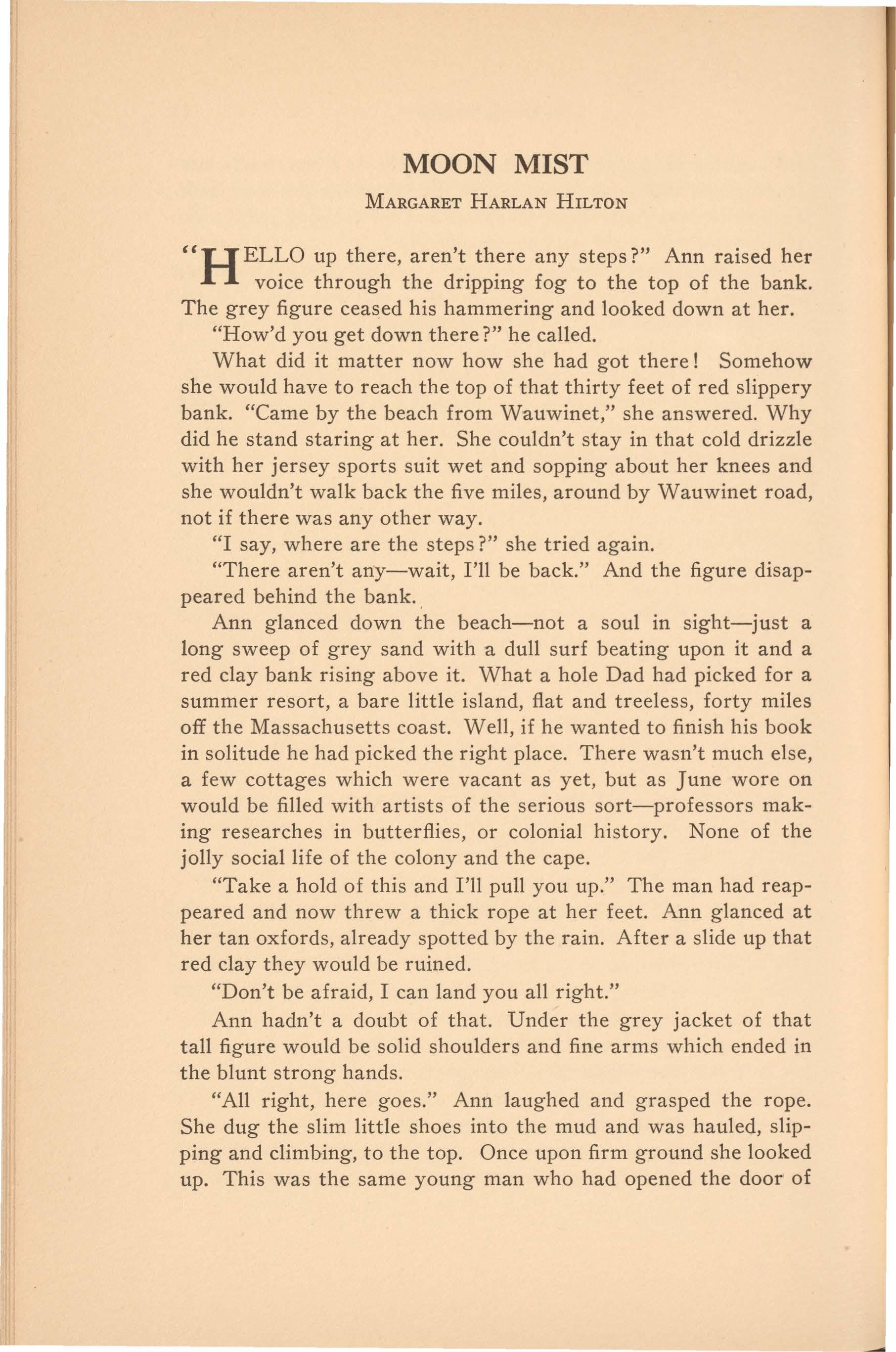
MOON MIST
MARGARET HARLAN HILTON
"HELLO up there, aren't there any steps?" Ann raised her voice through the dripping fog to the top of the bank. The grey figure ceased his hammering and looked down at her.
"How'd you get down there?" he called.
What did it matter now how she had got there! Somehow she would have to reach the top of that thirty feet of red slippery bank. "Came by the beach from Wauwinet," she answered. Why did he stand staring at her. She couldn't stay in that cold drizzle with her jersey sports suit wet and sopping about her knees and she wouldn't walk back the five miles, around by Wauwinet road, not if there was any other way.
"I say, where are the steps?" she tried again.
"There aren't any-wait, I'll be back." And the figure disappeared behind the bank.
Ann glanced down the beach-not a soul in sight-just a long sweep of grey sand with a dull surf beating upon it and a red clay bank rising above it. What a hole Dad had picked for a summer resort, a bare little island, flat and treeless, forty miles off the Massachusetts coast. Well, if he wanted to finish his book in solitude he had picked the right place. There wasn't much else, a few cottages which were vacant as yet, but as June wore on would be filled with artists of the serious sort-professors making researches in butterflies, or colonial history. None of the jolly social life of the colony and the cape.
"Take a hold of this and I'll pull you up." The man had reappeared and now threw a thick rope at her feet. Ann glanced at her tan oxfords, already spotted by the rain. After a slide up that red clay they would be ruined.
"Don't be afraid, I can land you all right."
Ann hadn't a doubt of that. Under the grey jacket of that tall figure would be solid shoulders and fine arms which ended in the blunt strong hands.
"All right, here goes." Ann laughed and grasped the rope. She dug the slim little shoes into the mud and was hauled, slipping and climbing, to the top. Once upon firm ground she looked up. This was the same young man who had opened the door of
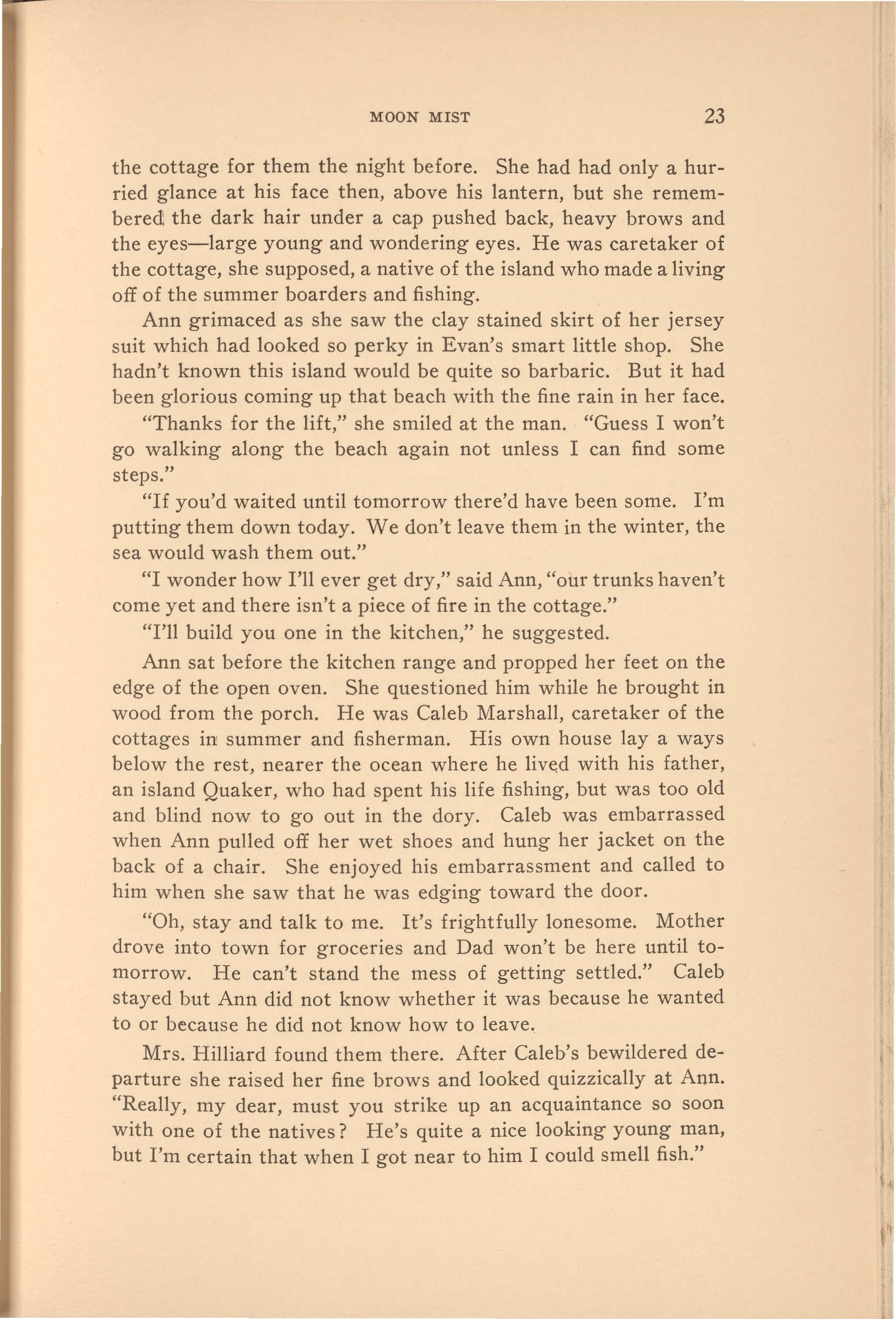
the cottage for them the night before. She had had only a hurried glance at his face then, above his lantern, but she remembered: the dark hair under a cap pushed back, heavy brows and the eyes-large young and wondering eyes. He was caretaker of the cottage, she supposed, a native of the island who made a living off of the summer boarders and fishing.
Ann grimaced as she saw the clay stained skirt of her jersey suit which had looked so perky in Evan's smart little shop. She hadn't known this island would be quite so barbaric. But it had been glorious coming up that beach with the fine rain in her face.
"Thanks for the lift," she smiled at the man. "Guess I won't go walking along the beach again not unless I can find some steps."
"If you'd waited until tomorrow there'd have been some. I'm putting them down today. We don't leave them in the winter, the sea would wash them out."
"I wonder how I'll ever get dry," said Ann, "our trunks haven't come yet and there isn't a piece of fire in the cottage."
"I'll build you one in the kitchen," he suggested.
Ann sat before the kitchen range and propped her feet on the edge of the open oven. She questioned him while he brought in wood from the porch. He was Caleb Marshall, caretaker of the cottages in summer and fisherman. His own house lay a ways below the rest, nearer the ocean where he livt:d with his father, an island Quaker, who had spent his life fishing, but was too old and blind now to go out in the dory. Caleb was embarrassed when Ann pulled off her wet shoes and hung her jacket on the back of a chair. She enjoyed his embarrassment and called to him when she saw that he was edging toward the door.
"Oh, stay and talk to me. It's frightfully lonesome. Mother drove into town for groceries and Dad won't be here until tomorrow. He can't stand the mess of getting settled." Caleb stayed but Ann did not know whether it was because he wanted to or because he did not know how to leave.
Mrs. Hilliard found them there. After Caleb's bewildered departure she raised her fine brows and looked quizzically at Ann. "Really, my dear, must you strike up an acquaintance so soon with one of the natives? He's quite a nice looking young man, but I'm certain that when I got near to him I could smell fish."
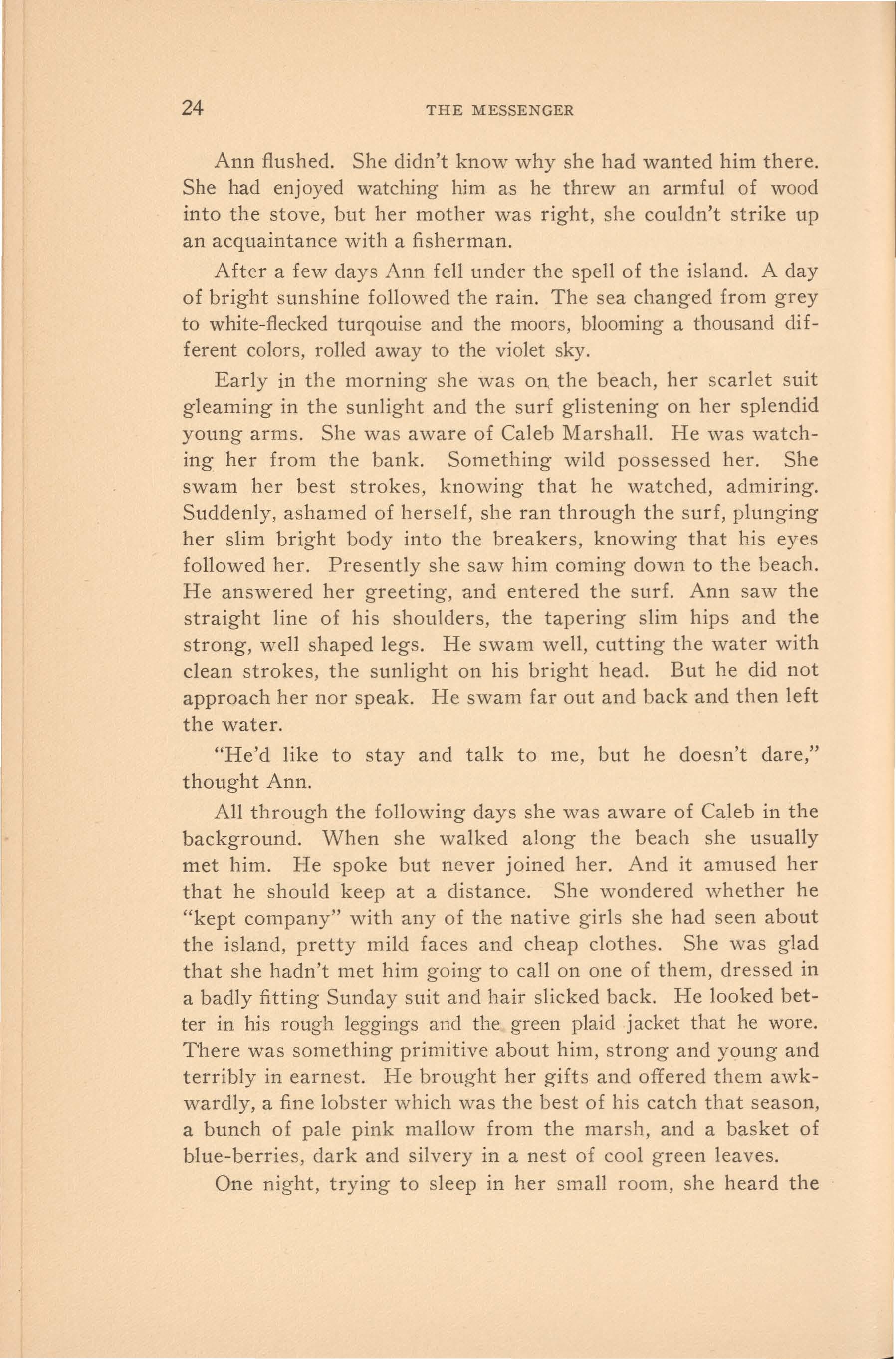
THE MESSENGER
Ann flushed. She didn't know why she had wanted him there. She had enjoyed watching him as he threw an armful of wood into the stove, but her mother was right, she couldn't strike up an acquaintance with a fisherman.
After a few days Ann fell under the spell of the island. A day of bright sunshine followed the rain. The sea changed from grey to white-flecked turqouise and the moors, blooming a thousand different colors, rolled away to the violet sky.
Early in the morning she was on the beach, her scarlet suit gleaming in the sunlight and the surf glistening on her splendid young arms. She was aware of Caleb Marshall. He ·was watching her from the bank. Something wild possessed her. She swam her best strokes, knowing that he watched, admiring. Suddenly, ashamed of herself, she ran through the surf, plunging her slim bright body into the breakers, knowing that his eyes followed her. Presently she saw him coming down to the beach. He answered her greeting, and entered the surf. Ann saw the straight line of his shoulders, the tapering slim hips and the strong, well shaped legs. He swam well, cutting the water with clean strokes, the sunlight on his bright head. But he did not approach her nor speak. He swam far out and back and then left the water.
"He'd like to stay and talk to me, but he doesn't dare," thought Ann.
All through the following days she was aware of Caleb in the background. When she walked along the beach she usually met him. He spoke but never joined her. And it amused her that he should keep at a distance. She wondered whether he "kept company" with any of the native girls she had seen about the island, pretty mild faces and cheap clothes. She was glad that she hadn't met him going to call on one of them, dressed in a badly fitting Sunday suit and hair slicked back. He looked better in his rough leggings and the green plaid jacket that he wore. There was something primitive about him, strong and young and terribly in earnest. He brought her gifts and offered them awkwardly, a fine lobster which was the best of his catch that season, a bunch of pale pink mallow from the marsh, and a basket of blue-berries, dark and silvery in a nest of cool green leaves.
One night, trying to sleep in her small room, she heard the
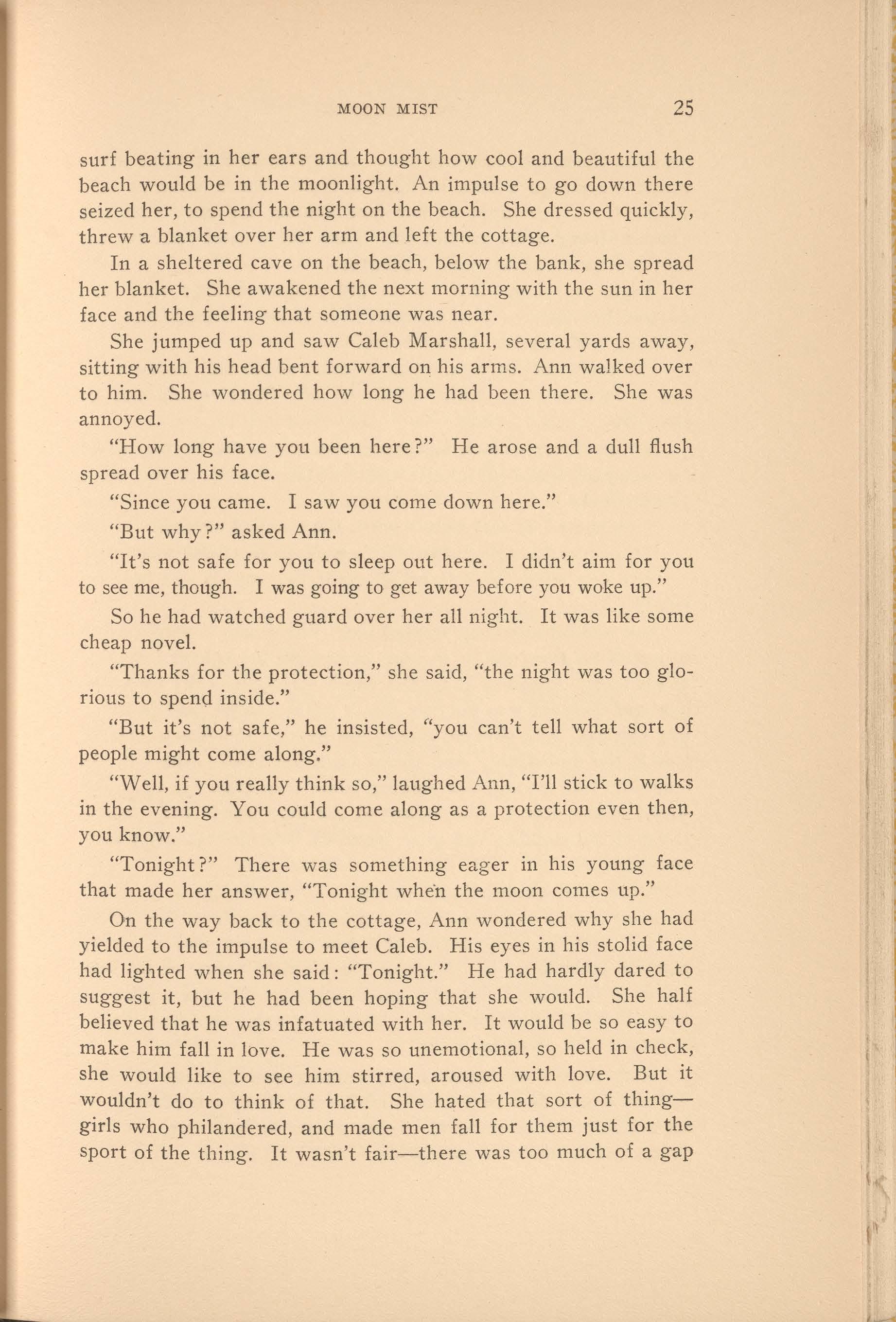
MOON MIST
surf beating in her ears and thought how cool and beautiful the beach would be in the moonlight. An impulse to go down there seized her, to spend the night on the beach. She dressed quickly, threw a blanket over her arm and left the cottage.
In a sheltered cave on the beach, below the bank, she spread her blanket. She awakened the next morning with the sun in her face and the feeling that someone was near.
She jumped up and saw Caleb Marshall, several yards away, sitting with his head bent forward on his arms. Ann walked over to him. She wondered how long he had been there. She was annoyed.
"How long have you been here?" He arose and a dull flush spread over his face.
"Since you came . I saw you come down here."
"But why?" asked Ann.
"It's not safe for you to sleep out here. I didn't aim for you to see me, though. I was going to get away before you woke up."
So he had watched guard over her all night. It was like some cheap novel.
"Thanks for the protection," she said, "the night was too glorious to spend inside."
"But it's not safe," he insisted, ''you can't tell what sort of people might come along."
"Well, if you really think so," laughed Ann, "I'll stick to walks in the evening. You could come along as a protection even then, you know."
"Tonight?" There was something eager in his young face that made her answer, "Tonight whe n the moon comes up."
On the way back to the cottage, Ann wondered why she had yielded to the impulse to meet Caleb. His eyes in his stolid face had lighted when she said: "Tonight." He had hardly dared to suggest it, but he had been hoping that she would. She half believed that he was infatuated with her. It would be so easy to make him fall in love. He was so unemotional, so held in check, she would like to see him stirred, aroused with love. But it wouldn't do to think of that. She hated that sort of thinggirls who philandered, and made men fall for them just for the sport of the thing. It wasn't fair-there was too much of a gap
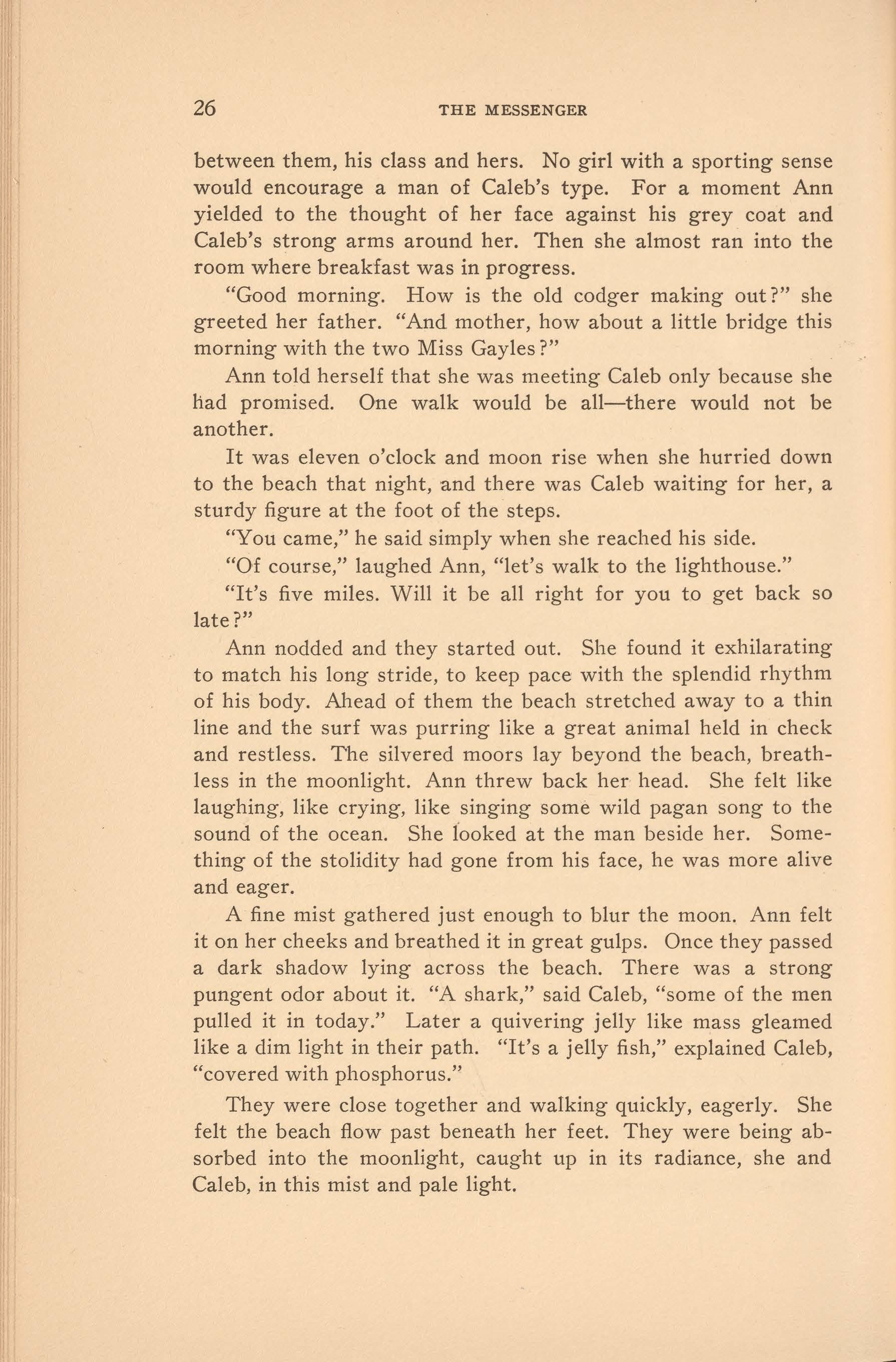
THE MESSENGER
between them, his class and hers. No girl with a sporting sense would encourage a man of Caleb's type. For a moment Ann yielded to the thought of her face against his grey coat and Caleb's strong arms around her. Then she almost ran into the room where breakfast was in progress.
"Good morning. How is the old codger making out?" she greeted her father. "And mother, how about a little bridge this morning with the two Miss Gayles?"
Ann told herself that she was meeting Caleb only because she had promised. One walk would be all-there would not be another.
It was eleven o'clock and moon rise when she hurried down to the beach that night, and there was Caleb waiting for her, a sturdy figure at the foot of the steps.
"You came," he said simply when she reached his side.
"Of course," laughed Ann, "let's walk to the lighthouse."
"It's five miles. Will it be all right for you to get back so late?"
Ann nodded and they started out. She found it exhilarating to match his long stride, to keep pace with the splendid rhythm of his body. Ahead of them the beach stretched away to a thin line and the surf was purring like a great animal held in check and restless. The silvered moors lay beyond the beach, breathless in the moonlight. Ann threw back her head. She felt like laughing, like crying, like singing some wild pagan song to the sound of the ocean. She iooked at the man beside her. Something of the stolidity had gone from his face, he was more alive and eager.
A fine mist gathered just enough to blur the moon. Ann felt it on her cheeks and breathed it in great gulps. Once they passed a dark shadow lying across the beach. There was a strong pungent odor about it. "A shark," said Caleb, "some of the men pulled it in today." Later a quivering jelly like mass gleamed like a dim light in their path. "It's a jelly fish," explained Caleb, "covered with phosphorus."
They were close together and walking quickly, eagerly. She felt the beach flow past beneath her feet. They were being absorbed into the moonlight, caught up in its radiance, she and Caleb, in this mist and pale light.

They were breathless when they reached the lighthouse. She watched the light as it reeled about over the water and the high beacon where wild winged creatures beat against the glass. But she knew that Caleb was watching only her face, drinking in the whiteness of her throat. His eyes were dark and wistful, his mouth like a child's, young and sincere. She put her arms about his neck and kissed him on the lips.
His arms trembled about her and his kiss was gentle at first, then so hard that it hurt her lips. Ann was aware that this was the first, the first time he had kissed a girl.
"Ann," his voice was husky. Then simply, "I l9ve you."
Ann started. He was serious. It was not just mist and moonlight and a pretty girl to him. He meant this. Vaguely she wondered what she had done. He was giving her his first love, his heart in his eyes.
"Ann-you feel it too-you love me."
Ann wrenched herself from his arms.
"No, no, Caleb, not that. It's just the night and the moonit-"
"But you kissed me," he said, so simply as a child giving an answer to something that was so very plain. How could she tell him that a kiss didn't mean that always, not in her crowd at least. You could give your lips on a night like this, but that wasn't love, not love like Caleb's. She would have to kill the joy in his face by telling him that.
"Let's go back," she said.
Caleb took her hand and kept her away from the breakers which reached their fingers farther onto the beach now. The mist was heavier and it was hard for Ann to see her way. Caleb held her hand in such a possessive way. He thought that she belonged to him now. But he must not think that. She had told him that she didn't love him! He would have to understand that it wasn't real to her. She couldn't have him feel that she was his now. What a little beast she was! It wasn't fair, he was so gentle and young and in earnest.
Finally she was alone, away from him. She lay in her bed, staring wide-eyed into the dark, hating herself, ashamed, but feeling the mist in her face and Caleb's arms about her.
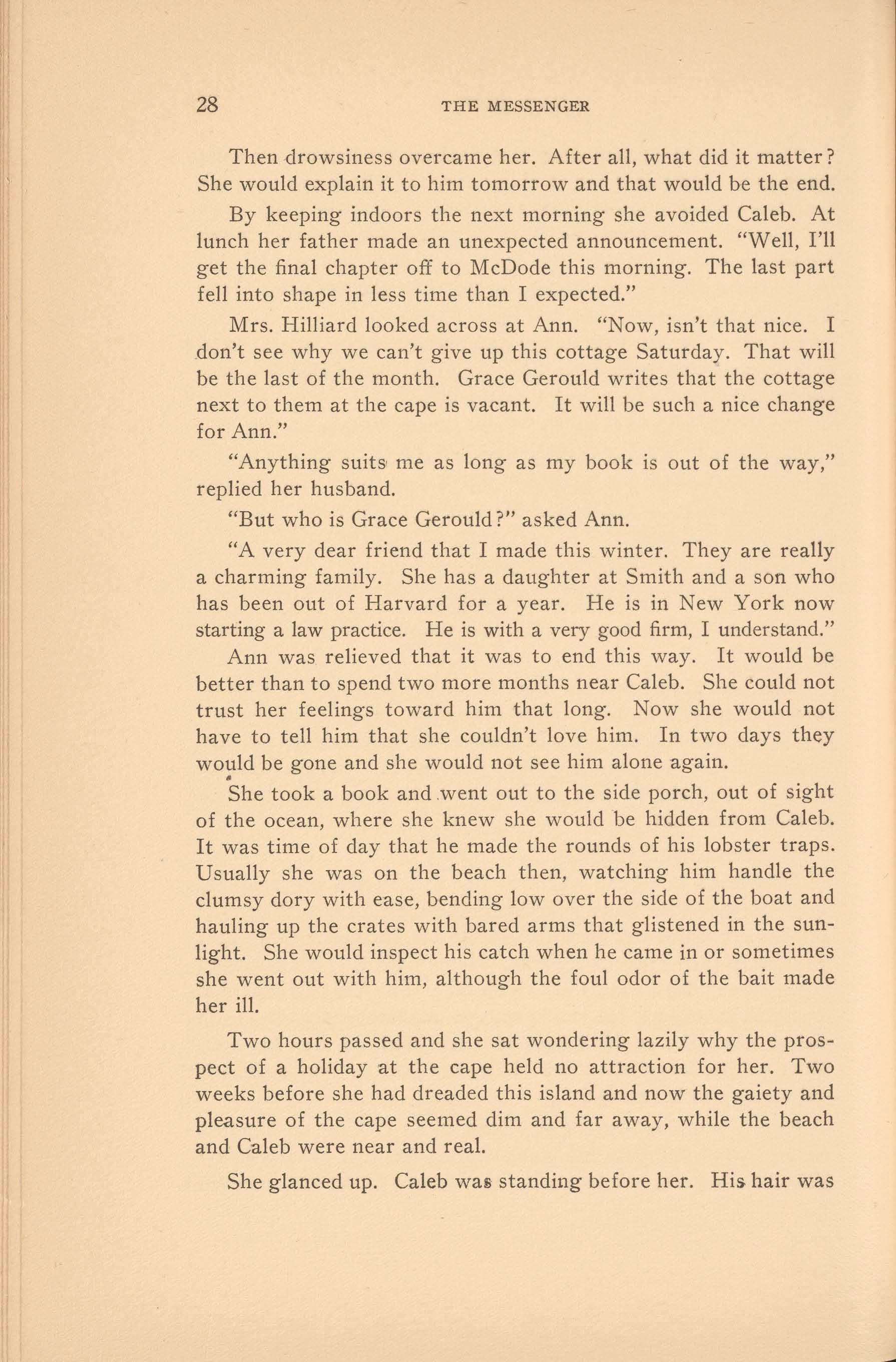
Then drowsiness overcame her. After all, what did it matter? She would explain it to him tomorrow and that would be the end. By keeping indoors the next morning she avoided Caleb. At lunch her father made an unexpected announcement. "Well, I'll get the final chapter off to McDode this morning. The last part fell into shape in less time than I expected."
Mrs. Hilliard looked across at Ann. "Now, isn't that nice. I .don't see why we can't give up this cottage Saturday. That will be the last of the month. Grace Gerould writes that the cottage next to them at the cape is vacant. It will be such a nice change for Ann."
"Anything suits , me as long as my book is out of the way," replied her husband.
"But who is Grace Gerould?" asked Ann.
"A very dear friend that I made this winter. They are really a charming family. She has a daughter at Smith and a son who has been out of Harvard for a year. He is in New York now starting a law practice. He is with a very good firm, I understand."
Ann was relieved that it was to end this way. It would be better than to spend two more months near Caleb. She could not trust her feelings toward him that long. Now she would not have to tell him that she couldn't love him. In two days they would be gone and she would not see him alone again .
. She took a book and went out to the side porch, out of sight of the ocean, where she knew she would be hidden from Caleb. It was time of day that he made the rounds of his lobster traps. Usually she was on the beach then, watching him handle the clumsy dory with ease, bending low over the side of the boat and hauling up the crates with bared arms that glistened in the sunlight. She would inspect his catch when he came in or sometimes she went out with him, although the foul odor of the bait made her ill.
Two hours passed and she sat wondering lazily why the prospect of a holiday at the cape held no attraction for her. Two weeks before she had dreaded this island and now the gaiety and pleasure of the cape seemed dim and far away, while the beach and Caleb were near and real.
She glanced up. Caleb was standing before her. His. hair was
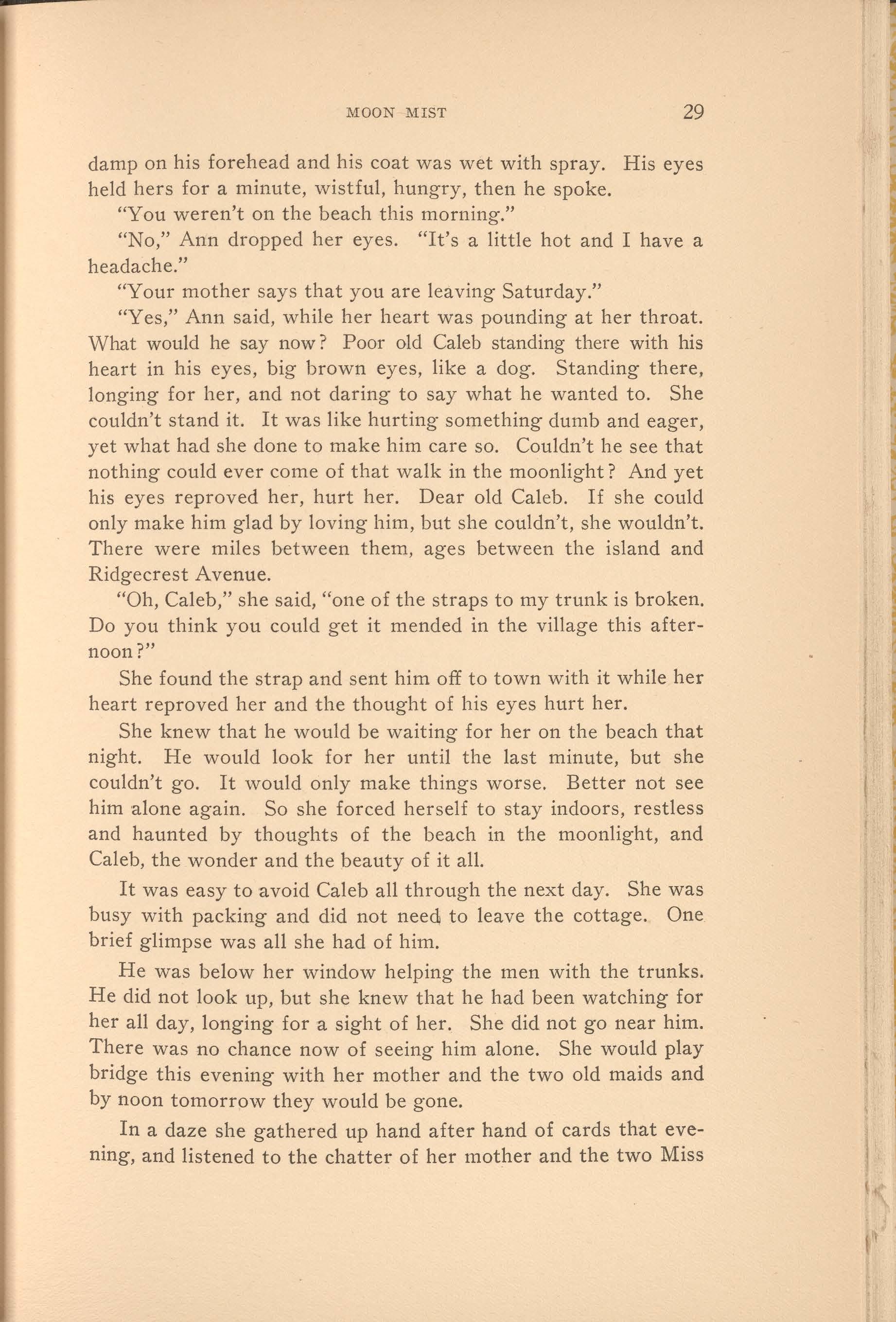
damp on his forehead and his coat was wet with spray. His eyes held hers for a minute, wistful, hungry, then he spoke.
"You weren't on the beach this morning."
"No," Ann dropped her eyes. "It's a little hot and I have a headache."
"Your mother says that you are leaving Saturday."
"Yes," Ann said, while her heart was pounding at her throat. What would he say now? Poor old Caleb standing there with his heart in his eyes, big brown eyes, like a dog. Standing there, longing for her, and not daring to say what he wanted to. She couldn't stand it. It was like hurting something dumb and eager, yet what had she done to make him care so. Couldn't he see that nothing could ever come of that walk in the moonlight? And yet his eyes reproved her, hurt her. Dear old Caleb. If she could only make him glad by loving him, but she couldn't, she wouldn't. There were miles between them, ages between the island and Ridgecrest Avenue.
"Oh, Caleb," she said, "one of the straps to my trunk is broken. Do you think you could get it mended in the village this afternoon?"
She found the strap and sent him off to town with it while her heart reproved her and the thought of his eyes hurt her.
She knew that he would be waiting for her on the beach that night. He would look for her until the last minute, but she couldn't go. It would only make things worse. Better not see him alone again. So she forced herself to stay indoors, restless and haunted by thoughts of the beach in the moonlight, and Caleb, the wonder and the beauty of it all.
It was easy to avoid Caleb all through the next day. She was busy with packing and did not need to leave the cottage. One brief glimpse was all she had of him.
He was below her window helping the men with the trunks. He did not look up, but she knew that he had been watching for her all day, longing for a sight of her. She did not go near him. There was no chance now of seeing him alone. She would play bridge this evening with her mother and the two old maids and by noon tomorrow they would be gone.
In a daze she gathered up hand after hand of cards that evening, and listened to the chatter of her mother and the two Miss

MESSENGER
Gayles, while out there in the moonlight Caleb was waiting for her.
"Yes, Miss Gayle, it's going to be very pleasant, especially for Ann, to have so many young people around. The poor child has been lonesome here, and the Gerould's have two daughters about Ann's age. Ann, I indicated hearts on my first lead. Very stupid of you, dear."
But she couldn't go to him now. She must not think of him, there on the beach with the wind in his hair and his eyes loving her. What if she should go, would it really matter? Wouldn't it hurt him more if she left the island without seeing him? Wouldn't it be best to give him one more memory of moonlight and love?
"Then there's a son," Ann heard her mother say, "who got his law degree from Harvard last year and has been starting his practice in New York. With a very good firm, I understand. He's going to be at the cape. Your lead, Ann, and my dear it isn't like you to forget what is trumps. Yes, it will be much more pleasant for Ann."
And this was the last time she could see Caleb, to tell him goodbye alone. Tomorrow at this time she would be on the Boston boat. And Caleb would be bitter at the thought that she had left without seeing him again. What were trumps? She'd forgotten again. Oh, yes, she remembered, hearts. Stupid, silly game, while out there was love and Caleb and beauty. What would it matter if she went to him?
It was after ten when Ann, finding herself the dummy arose and said, "I am going out to get a last look at the ocea!lf while you play this hand." Throwing a white shawl about her shoulders she went down on the beach.
Caleb was there as she had known he , would be, standing at the foot of the stairs. He heard her step and turned eagerly. Instantly his arms swept about her, his lips sought hers, the smooth boyish cheek against her own. He held her a long time so, then, "Oh, Ann, why didn't you come last night? I waited so long."
Ann took his head between her hands, and pulled it down to her shoulder. She loved the crisp feeling of his hair. "I'm so sorry, Caleb, but I thought it was better for us not to see each other again."
Caleb didn't understand. "But you wouldn't have gone without telling me goodbye."
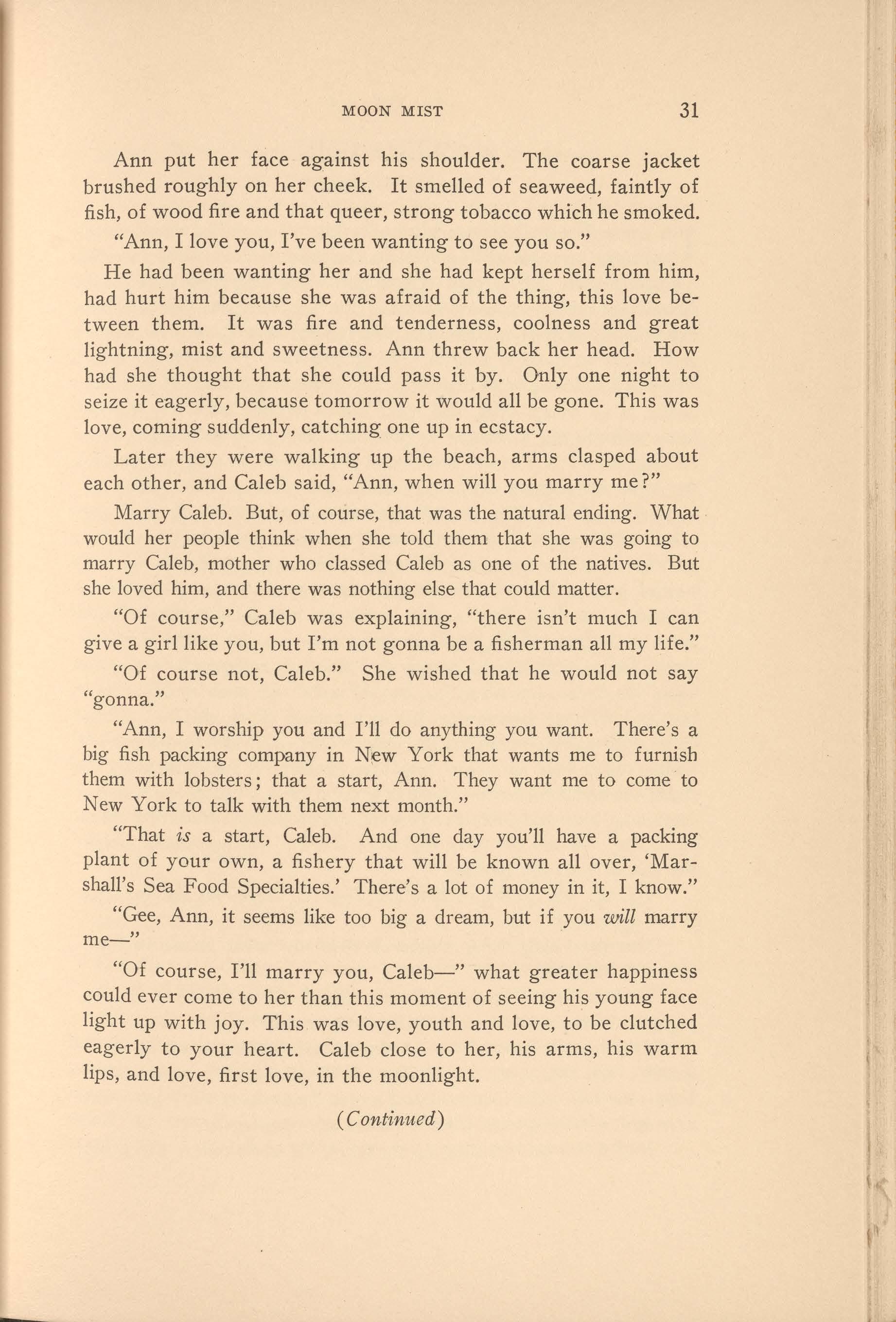
Ann put her face against his shoulder. The coarse jacket brushed roughly on her cheek. It smelled of seaweed, faintly of fish, of wood fire and that queer, strong tobacco which he smoked.
"Ann, I love you, I've been wanting to see you so."
He had been wanting her and she had kept herself from him, had hurt him because she was afraid of the thing, this love between them. It was fire and tenderness, coolness and great lightning, mist and sweetness. Ann threw back her head. How had she thought that she could pass it by. Only one night to seize it eagerly, because tomorrow it would all be gone. This was love, coming suddenly, catching one up in ecstacy.
Later they were walking up the beach, arms clasped about each other, and Caleb said, "Ann, when will you marry me?"
Marry Caleb. But, of course, that was the natural ending. What would her people think when she told them that she was going to marry Caleb, mother who classed Caleb as one of the natives. But she loved him, and there was nothing else that could matter.
"Of course," Caleb was explaining, "there isn't much I can give a girl like you, but I'm not gonna be a fisherman all my life."
"Of course not, Caleb." She wished that he would not say "gonna."
"Ann, I worship you and I'll do anything you want. There's a big fish packing company in N~w York that wants me to furnish them with lobsters; that a start, Ann. They want me to come to New York to talk with them next month."
"That is a start, Caleb. And one day you'll have a packing plant of your own, a fishery that will be known all over, 'Marshall's Sea Food Specialties.' There's a lot of money in it, I know.''
"Gee, Ann, it seems like too big a dream, but if you will marry me-"
"Of course, I'll marry you, Caleb-" what greater happiness could ever come to her than this moment of seeing his young face light up with joy. This was love, youth and love, to be clutched eagerly to your heart. Caleb close to her, his arms, his warm lips, and love, first love, in the moonlight.
(Continued)
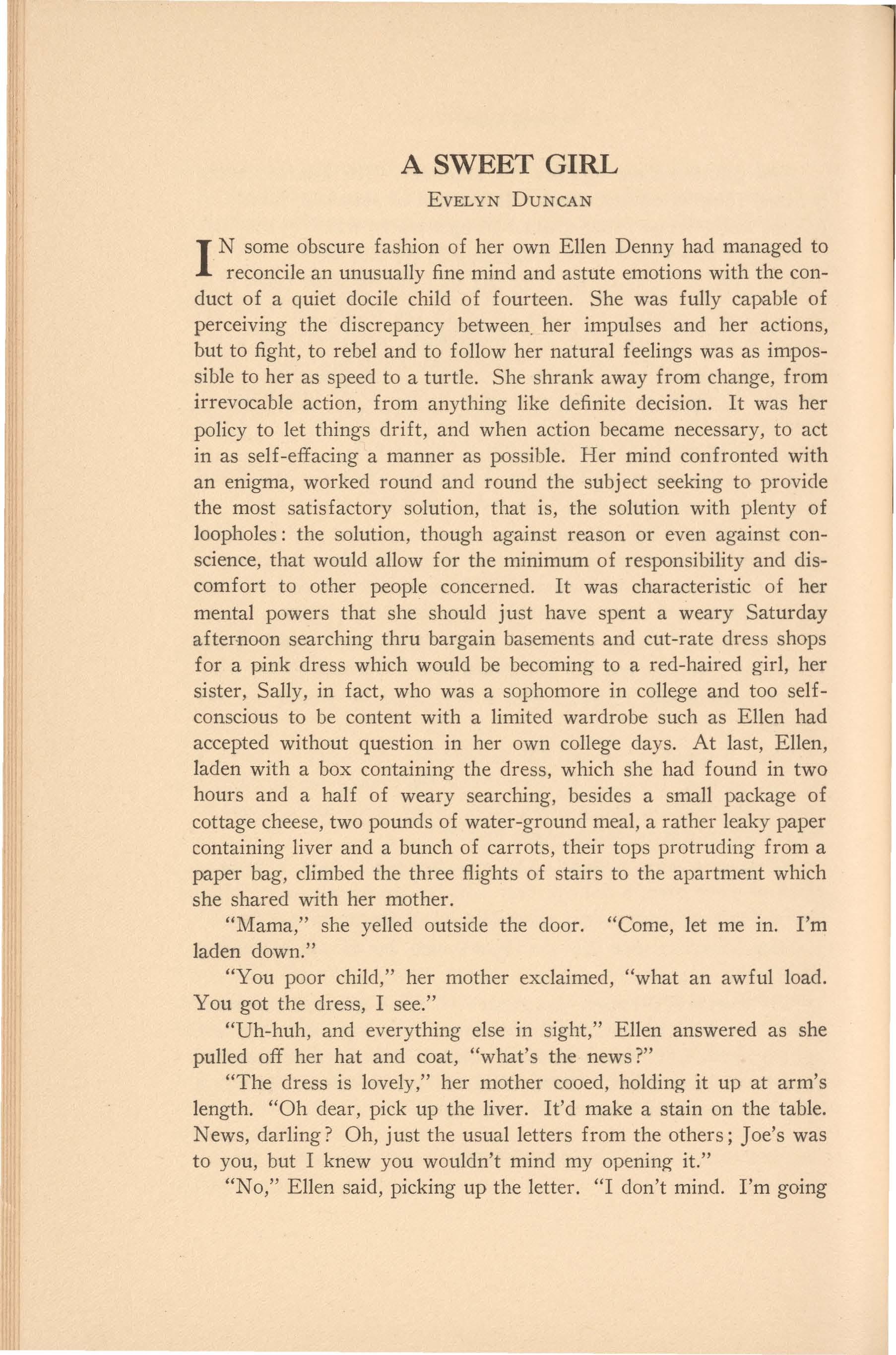
A SWEET GIRL
EVELYN DUNCAN
IN some obscure fashion of her own Ellen Denny had managed to reconcile an unusually fine mind and astute emotions with the conduct of a quiet docile child of fourteen. She was fully capable of perceiving the discrepancy between. her impulses and her actions, but to fight, to rebel and to follow her natural feelings was as impossible to her as speed to a turtle. She shrank away from change, from irrevocable action, from anything like definite decision. It was her policy to let things drift, and when action became necessary, to act in as self-effacing a manner as possible. Her mind confronted with an enigma, worked round and round the subject seeking to provide the most satisfactory solution, that is, the solution with plenty of loopholes : the solution, though against reason or even against conscience, that would allow for the minimum of responsibility and discomfort to other people concerned. It was characteristic of her mental powers that she should just have spent a weary Saturday after-noon searching thru bargain basements and cut-rate dress shops for a pink dress which would be becoming to a red-haired girl, her sister, Sally, in fact, who was a sophomore in college and too selfconscious to be content with a limited wardrobe such as Ellen had accepted without question in her own college days. At last, Ellen, laden with a box containing the dress, which she had found in two hours and a half of weary searching, besides a small package of cottage cheese, two pounds of water-ground meal, a rather leaky paper containing liver and a bunch of carrots, their tops protruding from a paper bag, climbed the three flights of stairs to the apartment which she shared with her mother.
"Mama," she yelled outside the door. "Come, let me in. I'm laden down."
"You poor child," her mother exclaimed, "what an awful load. You got the dress, I see."
"Uh-huh, and everything else in sight," Ellen answered as she pulled off her hat and coat, "what's the news?"
"The dress is lovely," her mother cooed, holding it up at arm's length. "Oh dear, pick up the liver. It'd make a stain on the table. News, darling? Oh, just the usual letters from the others; Joe's was to you, but I knew you wouldn't mind my opening it."
"No," Ellen said, picking up the letter. "I don't mind. I'm going

to bathe. I'll read them in the bath tub . And she moved off down the hall, swinging her dress as she went.
The water roared into the tub. Ellen stepped out of her underclothes, luxuriating in the warmth of the sun streaming through the dark red glass of the bathroom window. This was a "converted" house. You don't get red glass in modern apartments. The bathroom was large, the tub was large and fitted with shiny brass. Ellen loved its somewhat faded elegance Her reverie was interrupted by a banging on the door.
"Yes, Mamma," she called, then, "I can't hear you," and cut off the water. "What did you say?"
"I said, Mildred called," her mother repeated. "She wants you to come over tonight."
"Well, I'm not going," Ellen answered. "We'll talk about it presently ," she added, turning on the water again. 0, good Lord, go on away and let me wash in peace. What a thing to interrupt a bath for l Can't I have a little peace? She stepped into the bathtub, reaching for her letter on the chair with one hand as she turned off the water with the other.
"Dear Ellen," Joe wrote, "your letter, etc." Discussion of his various social activities followed. A peach of a girl that he had met. A little about his work. Then if you can spare me a ten until pay day .... Now, why hadn't mamma told her he wanted money? It was silly. Joe had more than she did, but then he was a boy. He had a lot to spend for and he was generous with his money when he had any. Used to send her a check now and then when she was in college. Well, she'd manage. She opened Sally's letter.
"DEAR MAM MA:
"I hope you or Ellen have condescended to get me a dress by this time (little pig), but if you haven't, please hurry up and do it, and while you are about it, get me a lightweight school dress. ( She can have that green linen that makes me look like a mummy.) I really don't see what you expect me to do. I'm practically naked. (Liar.)"
Ellen put the letter down, too irritated to read on. She soaped her self with angry concentrati on, rinsed, dried and dressed with suppressed fury. Fixing her hair before the mirror in her own room, she arranged her features into a pleasant smile as carefully as she coiled her smooth dark hair. It saved depressing questioning to wear upon her countenance the "outward and visible sign" of
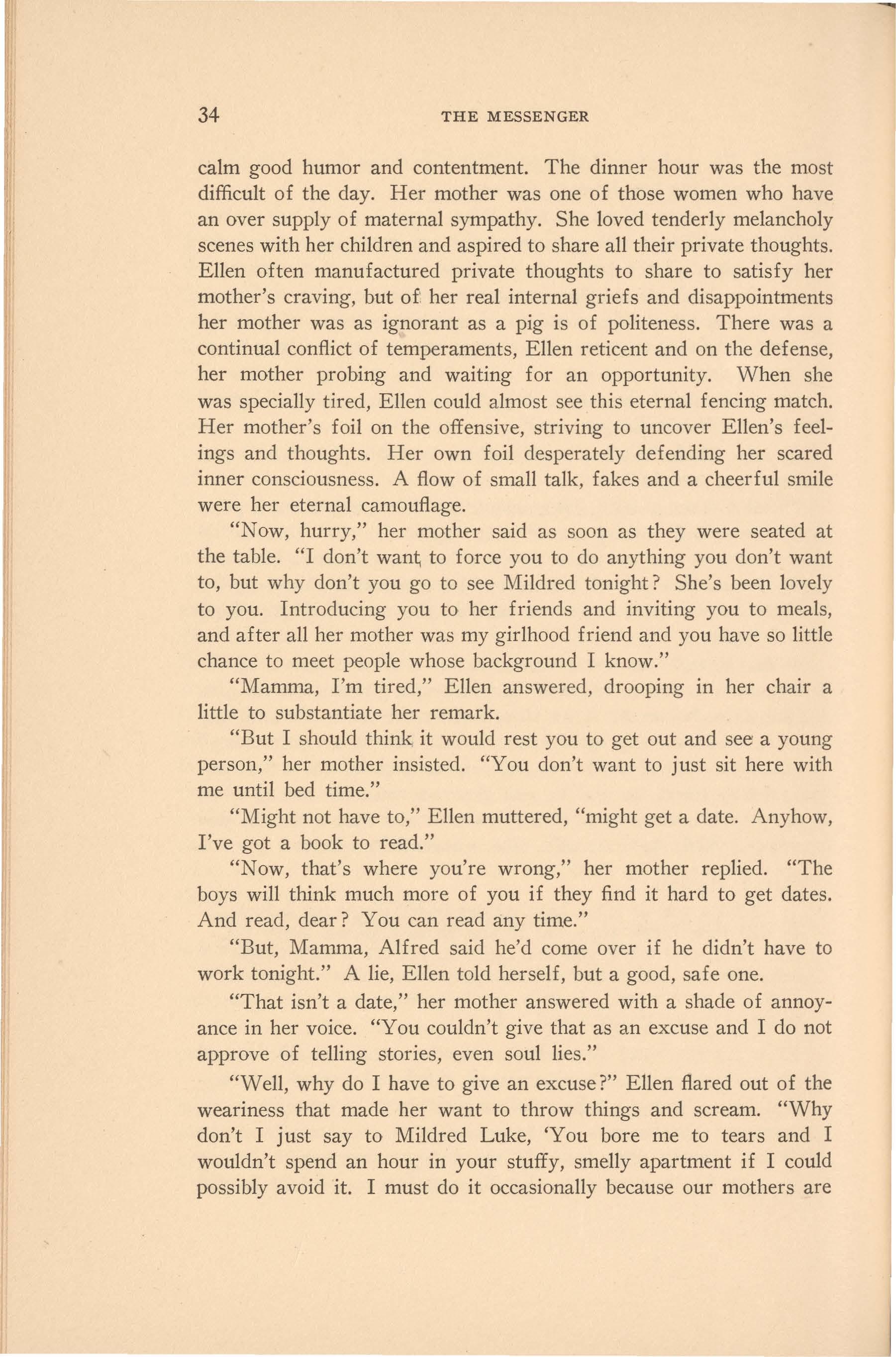
calm good humor and contentment. The dinner hour was the most difficult of the day. Her mother was one of those women who have an over supply of maternal sympathy. She loved tenderly melancholy scenes with her children and aspired to share all their private thoughts. Ellen often manufactured private thoughts to share to satisfy her mother's craving, but of ' her real internal griefs and disappointments her mother was as ignorant as a pig is of politeness. There was a continual conflict of temperaments, Ellen reticent and on the defense, her mother probing and waiting for an opportunity. When she was specially tired, Ellen could almost see this eternal fencing match. Her mother's foil on the offensive, striving to uncover Ellen's feelings and thoughts. Her own foil desperately defending her scared inner consciousness. A flow of small talk, fakes and a cheerful smile were her eternal camouflage.
"Now, hurry," her mother said as soon as they were seated at the table. "I don't wan~ to force you to do anything you don't want to, but why don't you go to see Mildred tonight? She's been lovely to you. Introducing you to her friends and inviting you to meals, and after all her mother was my girlhood friend and you have so little chance to meet people whose background I know."
"Mamma, I'm tired," Ellen answered, drooping in her chair a little to substantiate her remark.
"But I should think it would rest you to get out and see a young person," her mother insisted. "You don't want to just sit here with me until bed time."
"Might not have to," Ellen muttered, "might get a date. Anyhow, I've got a book to read."
"Now, that's where you're wrong," her mother replied. "The boys will think much more of you if they find it hard to get dates. And read, dear? You can read any time."
"But, Mamma, Alfred said he'd come over if he didn't have to work tonight." A lie, Ellen told herself, but a good, safe one.
"That isn't a date," her mother answered with a shade of annoyance in her voice. "You couldn't give that as an excuse and I do not approve of telling stories, even soul lies."
"Well, why do I have to give an excuse?" Ellen flared out of the weariness that made her want to throw things and scream. "Why don't I just say to Mildred Luke, 'You bore me to tears and I wouldn't spend an hour in your stuffy, smelly apartment if I could possibly avoid it. I must do it occasionally because our mothers are
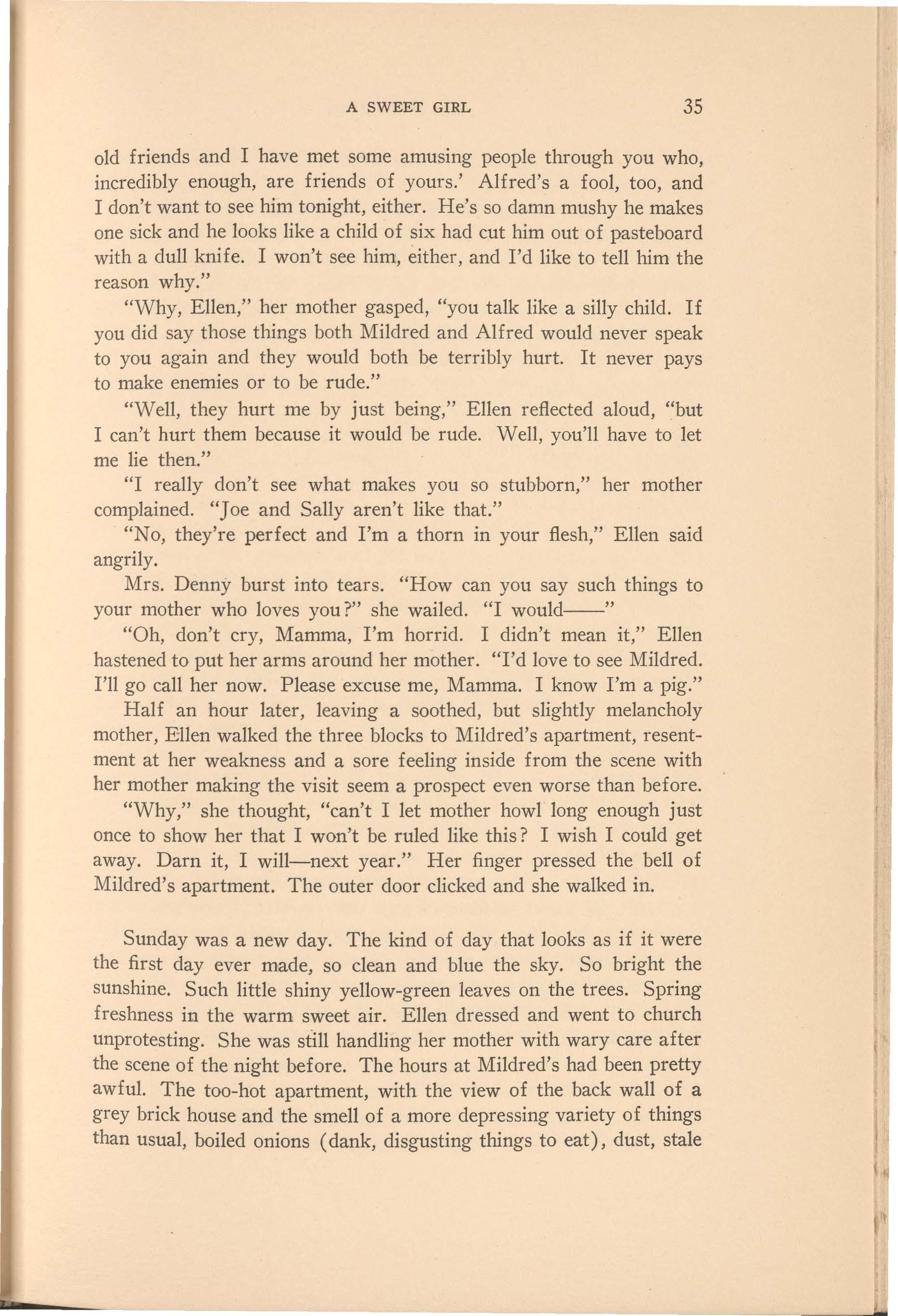
old friends and I have met some amusing people through you who, incredibly enough, are friends of yours.' Alfred's a fool, too, and I don't want to see him tonight, either. He's so damn mushy he makes one sick and he looks like a child of six had cut him out of pasteboard with a dull knife. I won't see him, either, and I'd like to tell him the reason why.''
"Why, Ellen," her mother gasped, "you talk like a silly child. If you did say those things both Mildred and Alfred would never speak to you again and they would both be terribly hurt. It never pays to make enemies or to be rude.''
"Well, they hurt me by just being," Ellen reflected aloud, "but I can't hurt them because it would be rude. Well, you'll have to let me lie then.''
"I really don't see what makes you so stubborn," her mother complained. "Joe and Sally aren't like that."
"No, they're perfect and I'm a thorn in your flesh," Ellen said angrily.
Mrs. Denny burst into tears. "How can you say such things to your mother who loves you?" she wailed. "I would--"
"Oh, don't cry, Mamma, I'm horrid. I didn't mean it," Ellen hastened to put her arms around her mother. "I'd love to see Mildred. I'll go call her now. Please excuse me, Mamma. I know I'm a pig.''
Half an hour later, leaving a soothed, but slightly melancholy mother, Ellen walked the three blocks to Mildred's apartment, resentment at her weakness and a sore feeling inside from the scene with her mother making the visit seem a prospect even worse than before.
"Why," she thought, "can't I let mother howl long enough just once to show her that I won't be ruled like this? I wish I could get away. Darn it, I will-next year.'' Her finger pressed the bell of Mildred's apartment. The outer door clicked and she walked in.
Sunday was a new day. The kind of day that looks as if it were the first day ever made, so clean and blue the sky. So bright the sunshine. Such little shiny yellow-green leaves on the trees. Spring freshness in the warm sweet air. Ellen dressed and went to church unprotesting. She was still handling her mother with wary care after the scene of the night before. The hours at Mildred's had been pretty awful. The too-hot apartment, with the view of the back wall of a grey brick house and the smell of a more depressing variety of things than usual, boiled onions ( dank, disgusting things to eat), dust, stale
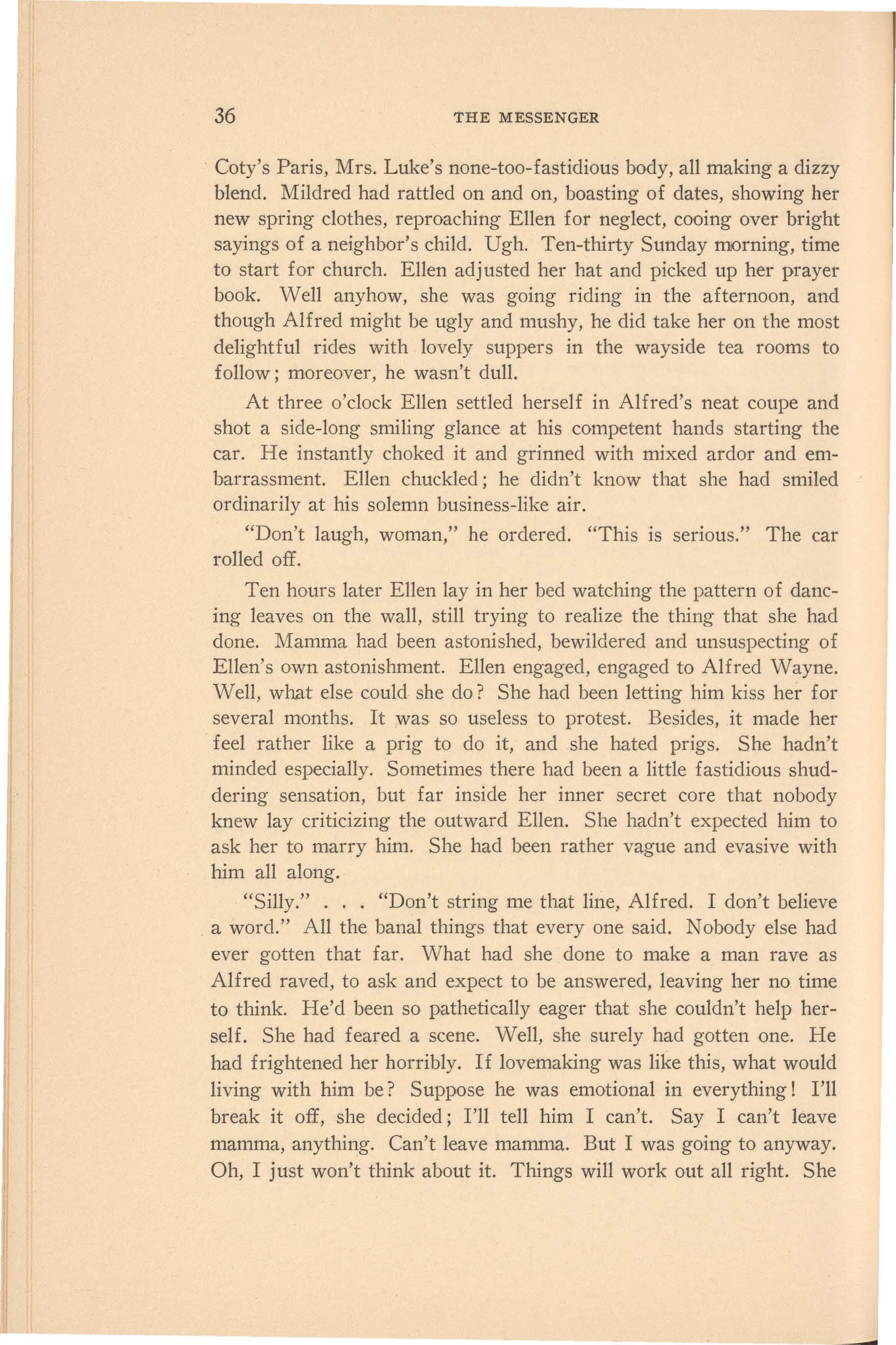
THE MESSENGER
Coty's Paris, Mrs. Luke's none-too-fastidious body, all making a dizzy blend. Mildred had rattled on and on, boasting of dates, showing her new spring clothes, reproaching Ellen for neglect, cooing over bright sayings of a neighbor's child. Ugh. Ten-thirty Sunday morning, time to start for church. Ellen adjusted her hat and picked up her prayer book. Well anyhow, she was going riding in the afternoon, and though Alfred might be ugly and mushy, he did take her on the most delightful rides with lovely suppers in the wayside tea rooms to follow; moreover, he wasn't dull.
At three o'clock Ellen settled herself in Alfred's neat coupe and shot a side-long smiling glance at his competent hands starting the car. He instantly choked it and grinned with mixed ardor and embarrassment. Ellen chuckled; he didn't know that she had smiled ordinarily at his solemn business-like air.
"Don't laugh, woman," he ordered. "This is serious." The car rolled off.
Ten hours later Ellen lay in her bed watching the pattern of dancing leaves on the wall, still trying to realize the thing that she had done. Mamma had been astonished, bewildered and unsuspecting of Ellen's own astonishment. Ellen engaged, engaged to Alfred Wayne. Well, what else could she do? She had been letting him kiss her for several months. It was so useless to protest. Besides, it made her feel rather like a prig to do it, and she hated prigs. She hadn't minded especially. Sometimes there had been a little fastidious shuddering sensation, but far inside her inner secret core that nobody knew lay criticizing the outward Ellen. She hadn't expected him to ask her to marry him. She had been rather vague and evasive with him all along.
"Silly." . . . "Don't string me that line, Alfred. I don't believe a word." All the banal things that every one said. Nobody else had ever gotten that far. What had she done to make a man rave as Alfred raved, to ask and expect to be answered, leaving her no time to think. He'd been so pathetically eager that she couldn't help herself. She had feared a scene. Well, she surely had gotten one. He had frightened her horribly. If lovemaking was like this, what would living with him be? Suppose he was emotional in everything! I'll break it off, she decided; I'll tell him I can't. Say I can't leave mamma, anything. Can't leave mamma. But I was going to anyway. Oh, I just won't think about it. Things will work out all right. She
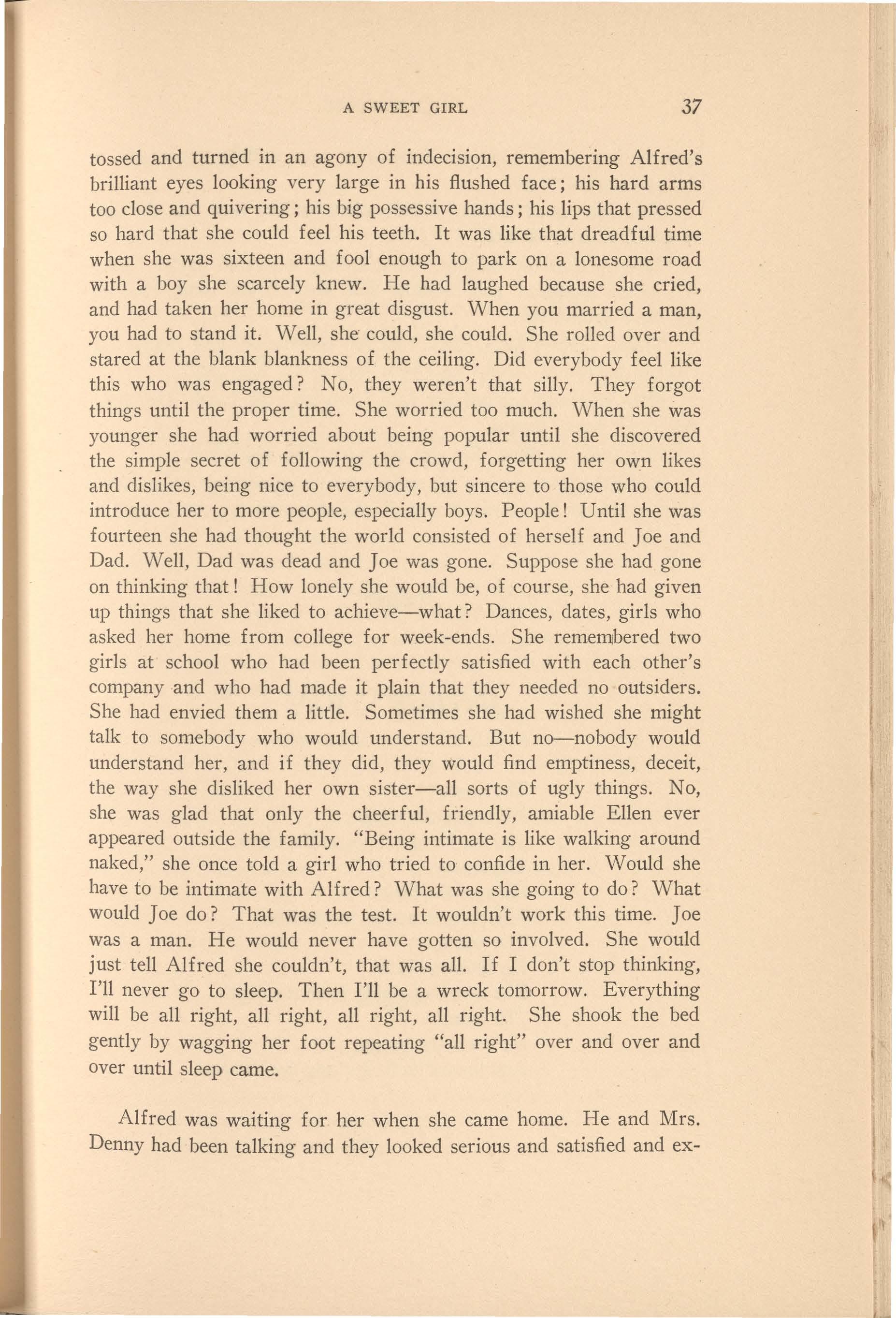
tossed and turned in an agony of indecision, remembering Alfred's brilliant eyes looking very large in his flushed face; his hard arms too close and quivering; his big possessive hands; his lips that pressed so hard that she could feel his teeth. It was like that dreadful time when she was sixteen and fool enough to park on a lonesome road with a boy she scarcely knew. He had laughed because she cried, and had taken her home in great disgust. When you married a man, you had to stand it. Well, she could, she could. She rolled over and stared at the blank blankness of the ceiling. Did everybody feel like this who was engaged? No, they weren't that silly. They forgot things until the proper time. She worried too much. When she was younger she had worried about being popular until she discovered the simple secret of following the crowd, forgetting her own likes and dislikes, being nice to everybody, but sincere to those who could introduce her to more people, especially boys. People! Until she was fourteen she had thought the world consisted of herself and Joe and Dad. Well, Dad was dead and Joe was gone. Suppose she had gone on thinking that ! How lonely she would be, of course, she had given up things that she liked to achieve-what? Dances, dates, girls who asked her home from college for week-ends. She remembered two girls at school who had been perfectly satisfied with each other's company and who had made it plain that they needed no outsiders. She had envied them a little. Sometimes she had wished she might talk to somebody who would understand. But no-nobody would understand her, and if they did, they would find emptiness, deceit, the way she disliked her own sister-all sorts of ugly things. No, she was glad that only the cheerful, friendly, amiable Ellen ever appeared outside the family. "Being intimate is like walking around naked," she once told a girl who tried to confide in her. Would she have to be intimate with Alfred? What was she going to do? What would Joe do? That was the test. It wouldn't work this time. Joe was a man. He would never have gotten so involved. She would just tell Alfred she couldn't, that was all. If I don't stop thinking, I'll never go to sleep. Then I'll be a wreck tomorrow. Everything will be all right, all right, all right, all right. She shook the bed gently by wagging her foot repeating "all right" over and over and over until sleep came.
Alfred was waiting for her when she came home. He and Mrs. Denny had been talking and they looked serious and satisfied and ex-
tremely happy. Mrs. Denny kissed her and smiling knowingly, at Alfred, started to go.
"Oh, don't go, Mamma," Ellen called, panicky now that the time to speak seemed so near.
"We have to eat, darling," Mrs. Denny answered gayly. "Even if you are engaged," and beaming still, she left the room, shutting the door behind her.
"Ellen, darling little Ellen," Alfred murmured, and caught her close in his arms. "Don't tuck your face down, kiss me."
Ellen obediently raised her face from his coat front. Her body felt rigid, tense, unreal.
"To think, to think that you are mine," he whispered.
And Ellen, looking into his radiant face, said nothing, only smiled. How could she hurt him? After all, she supposed she could stand it.
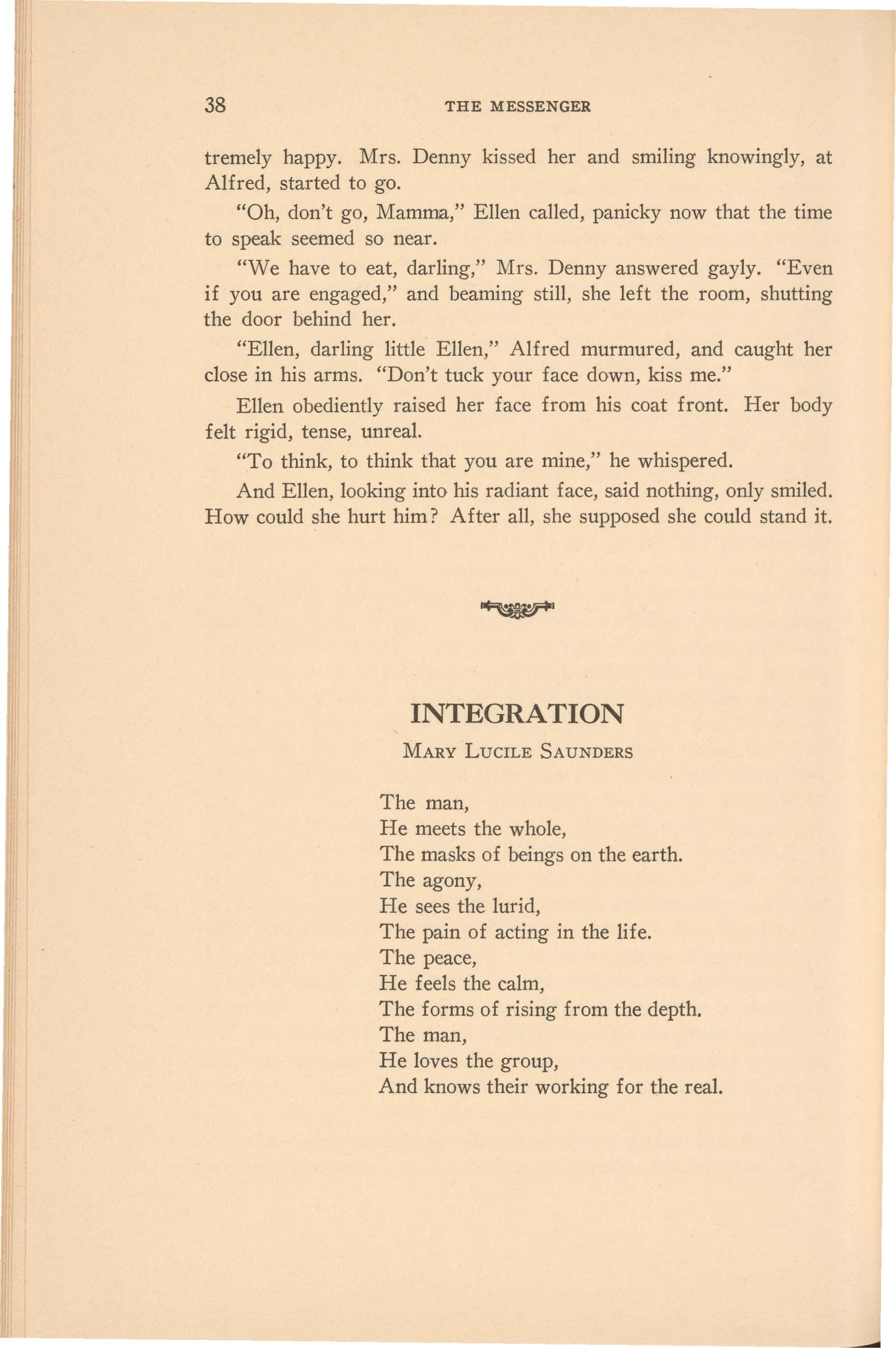
INTEGRATION
MARY LUCILE SAUNDERS
The man, He meets the whole, The masks of beings on the earth.
The agony, He sees the lurid, The pain of acting in the life.
The peace, He feels the calm, The forms of rising from the depth.
The man, He loves the group, And knows their working for the real.
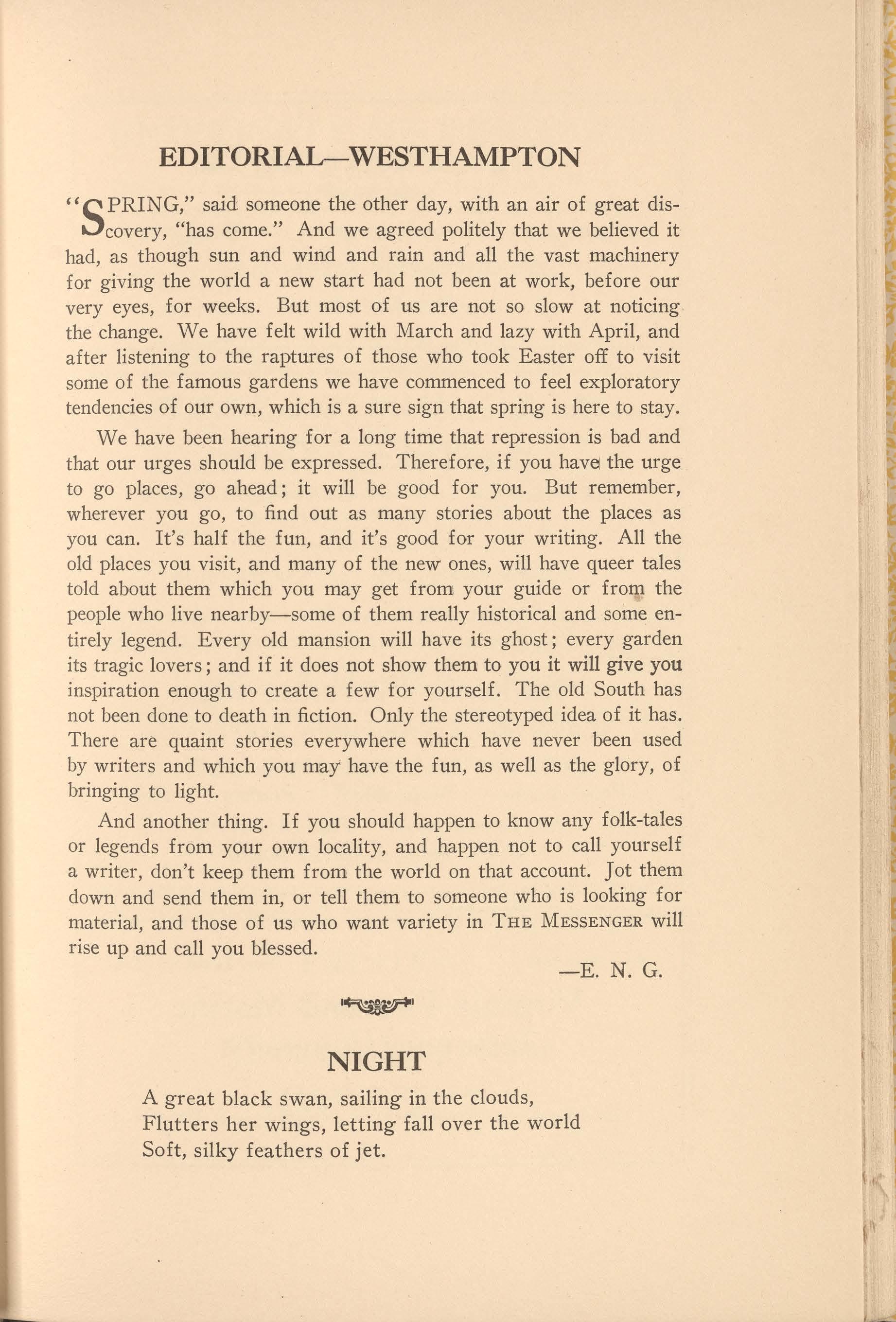
EDITORIAL-WESTHAMPTON
"SPRING," said someone the other day, with an air of great discovery, "has come." And we agreed politely that we believed it had, as though sun and wind and rain and all the vast machinery for giving the world a new start had not been at work, before our very eyes, for weeks. But most of us are not so slow at noticing the change. We have felt wild with March and lazy with April, and after listening to the raptures of those who took Easter off to visit some of the famous gardens we have commenced to feel exploratory tendencies of our own, which is a sure sign that spring is here to stay.
We have been hearing for a long time that repression is bad and that our urges should be expressed. Therefore, if you have! the urge to go places, go ahead; it will be good for you. But remember, wherever you go, to find out as many stories about the places as you can. It's half the fun, and it's good for your writing. All the old places you visit, and many of the new ones, will have queer tales told about them which you may get from your guide or from the people who live nearby-some of them really historical and some entirely legend. Every old mansion will have its ghost; every garden its tragic lovers; and if it does not show them to you it will give you inspiration enough to create a few for yourself. The old South has not been done to death in fiction. Only the stereotyped idea of it has. There are quaint stories everywhere which have never been used by writers and which you may have the fun, as well as the glory, of bringing to light.
And another thing. If you should happen to know any folk-tales or legends from your own locality, and happen not to call yourself a writer, don't keep them from the world on that account. Jot them down and send them in, or tell them to someone who is looking for material, and those of us who want variety in THE MESSENGERwill rise up and call you blessed.
-E. N. G.
NIGHT
A great black swan, sailing in the clouds, Flutters her wings, letting fall over the world Soft, silky feathers of jet.
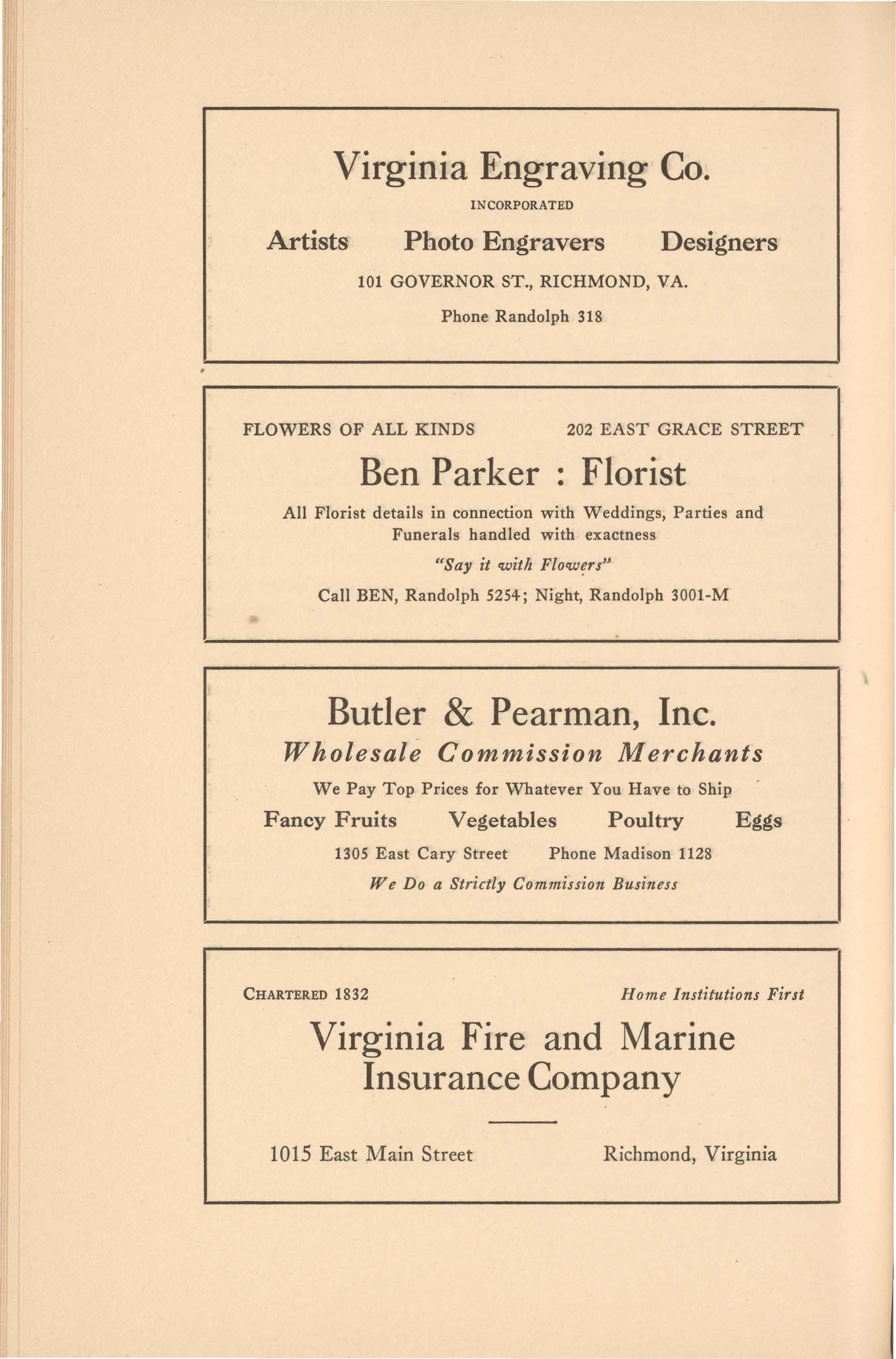
Ben Parker : Florist
UNIVERSITY OF RICHMOND
INCLUDES
1. RICHMONDCOLLEGE,a College of Liberal Arts for Men.
2. WESTHAMPTON COLLEGE,a College of Liberal Arts for Women.
3. THE T. C. WILLIAMS SCHOOLOF LAW, a Professional School of Law, offering the Degree of LL. B.
4. THE EVENING SCHOOLOF BUSINESSADMINISTRATION.H. H. Seay, Jr., M. A., Director.
S. THE SUMMER SCHOOL, W. L. Prince, M. A., Director.
RICHMOND COLLEGE FOR MEN (W L Prince, M. A., Dean). Richmond College for Men is an old and well-endowed College of Liberal Arts, which is recognized everywhere as a Standard Ameri• can College.
WESTHAMPTON COLLEGE (May Lansfield Keller, Ph. D , Dean) A stand a rd college for women , holding membership in the Associa• tion of American University Women.
THE T. C. WILLIAMS SCHOOL OF LAW (M . R. Doubles, B. S , LL. B., J. D., Dean). Three years required for degree of LL B. in the Morning Division , four years in the Evening Division. Strong faculty of ten professors Large Library. Moderate Fees. Open to both Men and Women. Students who so desire can work their way.
For Catalogue or other information , concerning entrance into any college, address the Dean or Director
F. W. BOATWRIGHT, President
Ezekiel& WeilmanCo.,Inc.
SEVENTH AND CARY STS.

RICHMOND, VIRGINIA
Hotel and Institution Equipment for Kitchen and Dining Room Drug Store Fixtures Carbonators
